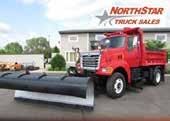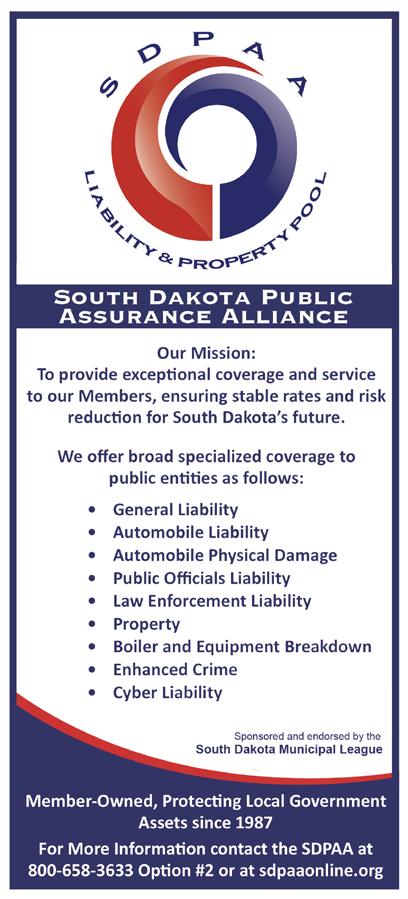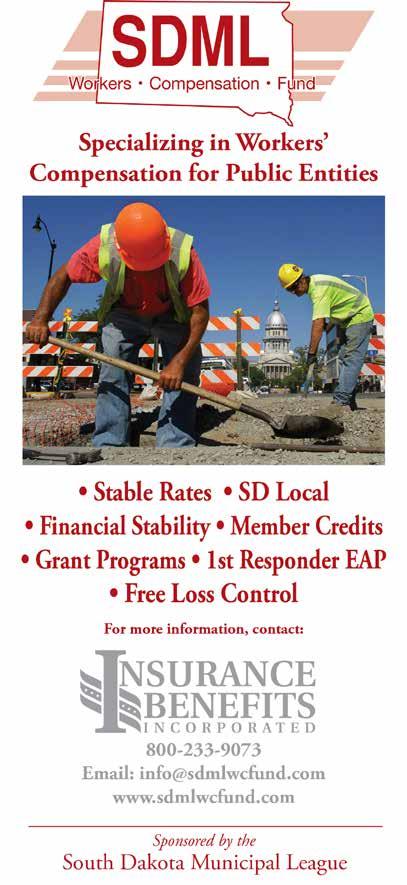












Colliers Securities offers a robust foundation in serving the needs of non-profits, units of state and local government and other tax-exempt entities.
For over 40 years we have served South Dakota’s local and state governments, school districts, counties and cities, underwriting over $6 billion in bonds for South Dakota public entities since 1990.
We look forward to serving your public finance needs!

Tom Grimmond
Sioux Falls, South Dakota
Phone
605.339.9800 | 800.339.1111 tom.grimmond@colliers.com

colliers.com find us under services

Toby Morris
Pierre, South Dakota
Phone
605.224.5557 | 877.224.5557 tobin.morris@colliers.com
PRESIDENT
Carolynn Anderson Finance Officer, Wall
1st VICE PRESIDENT
Leland Treichel
President of the Board, Roscoe
2nd VICE PRESIDENT
Michelle DeNeui Finance Officer, Spearfish
TRUSTEES
David Barranco
Councilmember, Sioux Falls
Paullyn Carey Finance Director, Huron
Lance Lehmann
Councilmember, Rapid City
Dawn Murphy Finance Officer, Tea
Laurie Woodward
City Administrator/Finance Officer, Custer
PAST PRESIDENT
Harry Weller Mayor, Kadoka
Sara Rankin
Dist. 1 | Mike Grosek Mayor, Webster
Dist. 2 | Jameson Berreth
City Administrator, Madison
Dist. 3 | Derick Wenck Mayor, Harrisburg
Dist. 4 | Shauna Meyerink, Finance Officer, Platte
Dist. 5 | Kristi Honeywell, City Administrator, Pierre
Dist. 6 | Rick Boschee Mayor, Bowdle
Dist. 7 | Gary Weismantel Mayor, Herreid
Dist. 8 | Brittany Smith City Administrator, Philip
Dist. 9 | Misty Summers-Walton
Officer, Hot Springs
10 | Gina Carpenter
Officer,
Executive Director
Jessica Carr Director of Member Engagement
Emilie Miller Director of Marketing and Communications
Lisa Nold Director of Risk Sharing Services
Lori Butler Director of Finance
Jackie Lopour Accounting Assistant
Rob Peterson Director of Municipal Electric Services
Krista Kerns Administrative Services Coordinator
SD Public Assurance Alliance
Lynn Bren
Executive Director
Kristina Peterson Deputy Director
Becky Brunsing Member Services Representative
Susan Kiepke Member Services Representative
Paytra Nichols Underwriter
sdmunicipalleague.org | 1.800.658.3633 | Fax: 605.224.8655
SOUTH DAKOTA MUNICIPALITIES (ISSN 0300-6182, USPS 503-120) is the official publication of the South Dakota Municipal League, published monthly at 208 Island Drive, Ft. Pierre, South Dakota 57532, phone 605-224-8654. This institution is an equal opportunity provider, and employer. Periodical postage paid at Pierre, South Dakota, and additional mailing offices. Non-member subscriptions are available for $30 annually. The opinions expressed herein are not necessarily those of the South Dakota Municipal League. Postmaster: Send address changes to SOUTH DAKOTA MUNICIPALITIES, 208 Island Drive, Ft. Pierre, South Dakota 57532. Please recycle this magazine.
SARA RANKIN | SDML EXECUTIVE DIRECTOR
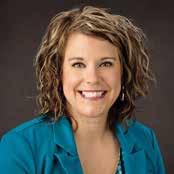
As we approach the end of another year, I want to take a moment to reflect on the hard work, collaboration, and dedication that has defined 2024 for our communities and municipalities. This year has been filled with both challenges and triumphs, but what has remained constant is the shared commitment to improving the quality of life for our residents across the state of South Dakota.
The holiday season is a time for gratitude, and I am deeply thankful for the tireless efforts of our municipal leaders, staff, and volunteers. Your continued dedication to your communities and to each other has been inspiring, and it’s a privilege to work alongside such passionate and driven individuals.
The ultimate example of this dedication is the work done by municipalities to defeat Initiated Measure 28. The League called on you as elected officials, staff, and residents
to help educate your residents and the public about the damaging impacts that IM-28 would bring for cities, and you did just that. We are grateful for your willingness to always step up to the plate when needed.
As we look towards the new year, I am excited about the opportunities ahead. Together, we will continue to strengthen our municipalities, support local control, and tackle the issues that matter most to the residents we serve.
During this season, I encourage each of you to take time to recharge, spend time with loved ones, and reflect on the positive impact you have made. May this holiday season bring you peace, joy, and renewed energy for the year to come.
On behalf of the South Dakota Municipal League, I wish you and your families a wonderful holiday season and a prosperous new year. ■

Another month has slipped away, and the election is over. I’m sure not everyone is happy with all the results, but I am relieved that IM-28 was voted down. That would have been a negative impact for our town, and it appears most of us felt the same for their towns. I was pleased with the large percentage of the population getting out and voting in this election. It is a privilege we need to take seriously.
I recently returned from the National League of Cities conference in Tampa, Florida. They were celebrating their 100th year and went all out for this milestone. They had entertainment for all the general sessions, along with great speakers. We heard from Lindsey Vonn, World Cup champion
and Olympic gold medal skier, and the entertainment on our last night was the Temptations. It was a busy conference with numerous breakout sessions.
When I have attend the conferences or trainings within our state, I noticed each municipality has a lot of the same things they deal with daily, whether they are large or small. I found it is the same with municipalities in other states as well. Housing and the workforce were the main topics, and everyone had the same goal - to help their community be the best that it can be.
With the holiday season now upon us, I want to wish everyone a blessed Christmas. Enjoy the family time. ■
































I was an intern from the University of South Dakota during the 1991 legislative session when I first became aware of the South Dakota Municipal League. During the internship, I learned that a staff member (Andrea Wagner) would be leaving to marry and move to Sioux Falls. She and my supervisor recommended I apply for the position. My interview was in the bowling alley in Vermillion, while the League staff was traveling for district meetings. A few weeks later, I was delighted to receive a letter stating that I was selected for the position of Director of Research for the SDML, at the grand salary of $19,500. The then-executive director (Bob Miller) liked to say “we give them great titles, but we don’t pay worth a damn!”











YVONNE TAYLOR | FORMER SDML EXECUTIVE DIRECTOR









Bob Miller had been the executive director for around 15 years, and in my second year with the SDML, he announced he would be retiring. Hired to replace him was John Thune, who amazed us all with his skill at knowing every person he ever met - by name - when he met them again. Now called Senator Thune, he obviously had other skills and a higher calling, as demonstrated by his recent appointment as the Majority Leader for the U.S. Senate.























Meanwhile, Senator Thune had decided to run for national office, and I was fortunately hired back as the executive director in 1996, a position I loved until I retired at the end of 2022.



The best part of the Municipal League has always been its members – and that goes deeper than the 309 municipalities. Each has a range of elected officials, appointed folks, and employees who make decisions every day to better their communities. I was always so proud to represent people I often (and still do) describe as the best people in South Dakota. For very little money, virtually no appreciation, and a boatload of guff, you all get up every day and do your best to make our cities and towns thrive.




Also during this time, I took my only break from working with the SDML and went to the Governor’s budget office, first (and briefly) under Governor Walter Dale Miller, and then under Governor Bill Janklow – a man for whom I had immense respect and admiration for his care for South Dakota and his “just get it done” work ethic. His depth of knowledge on all things State government was astounding.











In addition to the members, another great point of pride was the services offered to them by the SDML. From lobbying on their behalf, to the creation of programs to meet needs as they arose, starting with the three risk sharing pools, the FIT investment program, and other opportunities to share resources, the SDML was always there to help.





The SDML staff is amazing, and have been kind enough to let me hang around a bit, keeping a hand in on the lobbying and policy process. I was fortunate to be able to attend the 90th Annual Conference in Sioux Falls last month, and they continue to move the SDML forward and upward with new ideas and capabilities. I’m looking forward to watching them take the SDML into the next 90 years.









Happy birthday, SDML. Thanks for taking me along.













MCKAIA DYKEMA AND STEPHANIE MARTINEZ-RUCKMAN, NATIONAL LEAGUE
Reprinted
The 2024-25 United States Supreme Court Term officially kicked off Oct. 7. Several significant cases that could impact local governments and their interests are before the court this term.
The National League of Cities (NLC), through partnership with the Local Government Legal Center (LGLC), has joined several amicus briefs supporting and advocating local government positions on key legal issues of relevance.
Cases of importance this term include questions of employment law issues related to Title VII and the Fair Labor Standards Act, environmental law and the permitting requirements under the Clean Water Act, the scope of authority for a federal regulation relating to “ghost guns,” when attorney’s fees can be assigned and The Americans with Disabilities Act. As the Supreme Court accepts additional cases to their current term docket, NLC will keep local leaders informed on important cases that impact local governments.
This case is related to an important employment law question under Title VII. Title VII of the Civil Rights Act of 1964 prohibits discrimination in employment based on race, color, religion, sex or national origin. The specific issue is whether a plaintiff that belongs to the majority group of a class must show “background circumstances” supporting the suspicion that the defendant is an “unusual employer who discriminates against the majority.” This would be an additional element that the plaintiff must prove in addition to pleading the other elements of a Title VII discrimination claim.
This “background circumstances” test is one that the lower court found was

required, given that the plaintiff was a member of the majority group in this case. The court explained that a plaintiff can meet this additional showing with evidence that a member(s) of the relevant minority group of the class made the employment decision at issue or by showing a pattern of discrimination by the employer against members of the given majority group.
As local governments collectively continue to be one of the largest employers in the country, this is an important case that could impact the expansion of local government liability. Lawsuits under Title VII are expensive to defend and resource intensive for local governments. A ruling that applies the background circumstances test would make it harder for employees in majority groups passed over for promotions or subject to adverse employment decisions to bring Title VII lawsuits.
This is another employment law case related to the power burden of proof level that employers must satisfy to demonstrate the applicability of a Federal Labor Standards Act (FLSA) exemption to overtime pay. Generally, under FLSA, employers must pay employees overtime pay at a rate and a half for all work done above 40 hours a week. However, there are a number of exemptions from the FLSA’s minimum wage and overtime requirements. The exemption relevant to this case
is the “outside sales” exemption, which exempts employers from paying overtime for work done outside the office.
At issue in this case is the level of the burden of proof that must be demonstrated to show that the exemption applies. The parties disagree on whether the burden should be a “preponderance of the evidence” (the evidence shows more likely than not) or “clear and convincing evidence” (a significantly higher threshold).
This case directly impacts the burden of proof that local governments will need to show as an employer to demonstrate an exemption to overtime under FLSA. Claims under the FLSA are extremely common, and the burden of proof applies to each of the numerous exemptions. If the court finds that the higher standard of burden of proof applies, it will create significant financial implications for cities. Given the severe penalties for violating the rules under FLSA, there are significant potential liability issues at stake in this case for local governments.
The issue in this case is whether the U.S. Environmental Protection Agency (EPA) can impose generic prohibitions in their National Pollutant Discharge Elimination System (NPDES) permits without identifying specific limits
to which pollutant discharges must conform.
Under the Clean Water Act (CWA), the EPA has the authority to issue National Pollutant Discharge Elimination System (NPDES) permits that contain pollutant levels to provide manageable and precise benchmarks for enforcement. Contrary to the requirements of the CWA and EPA guidance, the permits EPA regularly issue impose generic prohibitions against pollutant discharging in a manner that contributes to exceeding applicable water quality standards. The generic prohibitions that are used in the NPDES permits issued to localities around the country create uncertainty and increase the risk that local governments will be subjected to signifi cant penalties. The generic water quality terms in the permits expose permitholders nationwide to enforcement actions while failing to tell them how much they need to limit or treat their discharges to comply with the CWA. A decision in this case would provide clarity to local governments on CWA requirements.
The issue in this case is whether a weapon parts kit that has been designed to or may readily be converted to expel a projectile by the action of an explosive is considered a “firearm” regulated under the Gun Control Act of 1968 (GCA). The GCA is the federal law that imposes licensing, background checks, recordkeeping and serialization requirements on persons engaged in the business of importing, manufacturing or dealing in firearms. In 2022, the Bureau of Alcohol, Tobacco, Firearms and Explosives (ATF) issued a regulation that clarified the definition of “firearm” under the GCA includes products and kits that can “readily be converted” into an operational firearm or a functional frame or receiver. These types of products are commonly referred to as “ghost guns.”
Ghost guns create signifi cant public safety concerns for local law enforcement as they allow minors and felons who are otherwise prohibited from owning guns under the GCA to obtain them without any background checks or
serialization requirements. This lack of serial numbers has created significant roadblocks for law enforcement in investigating violent crimes, as they cannot typically be traced. The Court will determine whether these “ghost gun” products are subjected to the requirements of the GCA or if these types of products do not meet the definition of a “firearm.”
The issue in this case involves the important question of deciding when attorney’s fees apply for plaintiffs in civil rights cases. Section 1988 of the U.S. Code provides that a prevailing party may collect attorney’s fees in certain civil suits (including Section 1983 actions). The Court will determine in this case what “prevailing” really means. The specific question is whether a plaintiff who obtains a preliminary injunction can obtain attorney’s fees under Section 1988 if there is never a permanent injunction or full ruling on the claim’s merits since the defendant voluntarily changed their conduct.








“Financial plans are more than just about money. They’re really about education and providing you with the knowledge you need to make the best decisions for your community.”
Miranda Kleven, PE, AE2S Special Projects Engineer










As local governments are party to civil suits (including under Section 1983 actions), a limitation in the award of attorney’s fees would result in a signifi cant fi nancial victory for local governments involved in these types of cases. Attorney’s fees can be as high or higher than the underlying liability or damages of a civil suit, and they regularly cost governments hundreds of thousands or millions of dollars. If the Court rules that attorney’s fees are appropriately awarded only when there is a conclusive ruling, this would significantly reduce future potential civil litigation costs for local governments.
This case presents a question of whether a former employee can sue their employer under The Americans with Disabilities Act (ADA) for discrimination in post-employment
distribution of fringe benefits if they no longer hold their job. Title I of the ADA prevents discrimination against individuals with disabilities regarding compensation and other terms of employment. Lower courts found that a former employee doesn’t qualify as an “individual with a disability” and therefore cannot bring suit for discrimination in post-employment distribution of fringe benefits.
Local governments are sometimes faced with diffi cult decisions when balancing the public fisc with other local government operations or initiatives. As local leaders continue to look for cost-saving mechanisms to balance their budgets, some may look to post-employment benefit liabilities as a place to potentially cut costs and fulfill their duties of fiscal responsibility. This case is important to ensure local governments have the flexibility and authority they need to make these difficult decisions without the threat of litigation. ■
Dues requests for 2025 South Dakota Municipal League membership were sent via email Nov. 12 to the contact for each municipality.
Members can also access the invoice by logging into the city’s membership account at www. sdmunicipalleague.org. The invoice will be located under the “Payments & History” tab on the left side.
Dues can be paid with a credit card using the link on that webpage, or a check can be sent to the SDML office. Payment is encouraged by Jan. 1, 2025, but a grace period is in effect for current members to ensure uninterrupted service and continuation of member benefits. ■


PIERRE, S.D. – The state minimum wage for non-tipped employees will increase from $11.20/hour to $11.50/hour effective Jan. 1, 2025.
The minimum wage is adjusted annually based on increases in the cost of living, as measured by the Consumer Price Index published by the U.S. Department of Labor. South Dakota implements this annual increase as established by SDCL 60-11-3.2, a law passed by the South Dakota Legislature that came into effect on Jan. 1, 2016.
The hourly minimum wage for tipped employees will be $5.75/hour effective Jan. 1, 2025, half the minimum wage for non-tipped employees. Wages and tips combined must equal at least the minimum wage.
These increases will apply to all South Dakota employers, with some limited exceptions. For more information, visit dlr.sd.gov/employment_laws/minimum_wage.aspx. ■
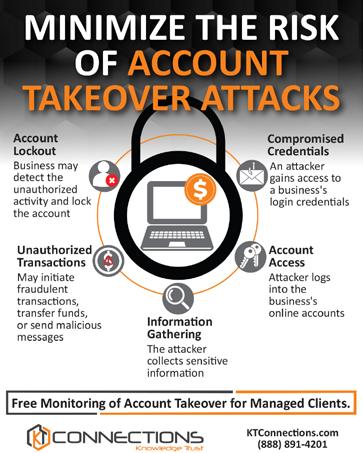
Membership registration for 2025 is now open for the 10 professional associations that are affiliates of the South Dakota Municipal League (SDML).
Each association functions separately to support its specific profession and members, but as affiliates, all receive SDML staff support for functions such as meetings, trainings, and group communication.
“Having these professional organizations as affiliates of the League is a mutually beneficial relationship,” said Jessica Carr, SDML director of member engagement. “Affiliates make it easy for SDML members to become involved, and the associations benefit from the shared resources such as administrative support, web presence, and event registration.”
While the League does provide consistency between the affiliates, each association focuses on supporting their members and causes important to that particular profession. Each maintains its own board and can provide resources such as networking opportunities, professional development, and access to research.
A summary of each association follows. To learn more and to register, visit the affiliate’s webpage on www. sdmunicipalleague.org. Annual memberships are valid for the upcoming 2025 calendar year. ►

Annual dues: $50 per city. Associate membership: $75/ person.
The South Dakota Airport Management Association (SDAMA) fosters the planning, development, use, and operation of public airports throughout South Dakota. The association assists its membership in resolving problems through mutual experiences in airport operations. In cooperation with the South Dakota Municipal League, the SDAMA takes an active part in legislation that may affect public airports in the state.
Annual dues: $50 per member attorney. Must represent a municipality that is a member of the South Dakota Municipal League.
The SD Municipal Attorneys' Association (SDMAA) establishes a forum by which municipalities may promote matters of mutual interest and provide a closer working relationship that there may be improvement in municipal government and administration by the following means:
1. The perpetuation of this organization as an agency for the cooperation of municipal law officers in the practical study of Municipal League problems
2. The holding of meetings for the discussion of legal and other questions affecting municipal governments
3. The furnishing of information to municipal law officers and departments in order to enable them to better perform their functions
4. The practical study of legislation, court decisions and administrative rulings relating to the public interest of municipal corporations and the publication of the results of such studies for the use of municipal law officers.
Annual dues:
• Governmental Membership: $50 for the initial membership; additional Governmental Individual memberships are $5 each
• Professional Membership: $50 for the initial membership; additional Professional Individual membership is $10 each
• Associate Membership: $25 each
The South Dakota Building Officials' Association (SDBOA) considers the principles and practices underlying the Laws and Ordinances relative to the construction, maintenance and occupancy of buildings, use of land, and methods of uniform administration thereof; the development of requirements and regulations pertaining thereto, to further the acquaintanceship and training of building officials and administration officers.
Annual dues:
• Full membership: $150 per person.
• Associate membership: $75 per person.
• Student membership: $15 per person.
The South Dakota City Management Association (SDCMA) aims to increase the proficiency of managers and administrators of local governments; to strengthen the quality of local government through professional management; to encourage and support the precepts of the council/manager plan; to maintain the high ethical standards of the profession of city management; and to provide opportunities to enhance the professional development of its members.
Annual dues: $75 per city, includes all code enforcement personnel that wish to participate.
The South Dakota Association of Code Enforcement (SoDACE) operates, without profit to the association or its members, as a state association to advance, educate, and improve efforts of state, county, city, and other political subdivision employees who are actively involved with and responsible for the enforcement of housing, municipal, county, state, or federal codes without regard to race, creed, color, national origin, or sex.
The association encourages professionalism with regard to the standardization of enforcement of environmental, and housing codes; supplies and advances the science and practice of code enforcement through certification and to provide training workshops, seminars, and conferences facilitating and advancing the administration of the various codes with which the association is concerned; exchanges information relating to the code enforcement profession; and promotes policies that will facilitate and improve code enforcement procedures.
Annual dues:
• Active membership: Based on megawatt hours purchased by the member municipality.
• Associate membership: $350 per organization contact.
The South Dakota Municipal Electric Association (SDMEA) is comprised of 35 member communities within South Dakota. The association works with their members to improve municipal electrics in South Dakota through problem solving, research, events, and publications geared to the enhancement of the municipal electric departments. The SDMEA serves member municipalities that provide electricity to approximately 100,000 South Dakotans.



Annual dues: $40 for the initial membership; additional members from the same city are $30 each.
The South Dakota Governmental Finance Officers' Association (SDGFOA) seeks to provide a forum by which cities and towns may promote matters of mutual interest and provide a closer working relationship that there may be improvement in municipal government and administration; to promote the improvement of methods of governmental
Professional organizations promote a profession, support its members, and serve the public. They can also help advance careers, develop employees, and provide public service. To get the most out of your involvement, be sure to develop relationships, keep your profile updated, and share your expertise and insights at every opportunity.
Professional development opportunities can help you learn new skills and stay on the leading edge on industry trends. You can even expand your own skill set by practicing new skills among supportive colleagues.
Networking
Professional organizations provide opportunities to meet peers in your field, discuss best practices, and learn about trends and developments. You can interact in person at meetings and trainings, or use online features such as group forums to connect.
Mentoring
Mentoring can help you achieve your personal and professional goals, and can be a key factor in accelerating your career growth.
Advocacy
Professional organizations can help decision makers understand what their members do in the workplace, why it's important, and the contributions they make.
Being a member of a professional organization can make you stand out to potential employers and show that you are dedicated to your career.
Building a Support System



The more individuals participating with you in an organization of your field of expertise, the more contacts, resources and access to information you have. ■
finance in South Dakota as developed and recommended by the Municipal Finance Officers' Association of the United States and Canada, the National Committee on Governmental Accounting, and other recognized authorities in the field of municipal administration, which include the development of mutually understandable procedures of accounting, budgeting, and financial reporting; the encouragement of the use of common terminology, classification, and principles in regard to those subjects; and to take an active part in legislation that may affect municipalities of the state through the South Dakota Municipal League.
Annual dues: $25 per person.
The South Dakota Governmental Human Resource Association (SDGHRA) seeks to advance the profession of human resource management in governmental entities by promoting matters of mutual interest and providing a closer working relationship so that there may be improvement in government and administration. Their mission is to promote the improvement of all aspects dealing with Human Resources in South Dakota through information sharing and consolidated training with a special emphasis on assisting smaller communities and to take an active part in legislation that may affect the governmental entities of the state through the South Dakota Municipal League.
Annual dues: $200 per city, includes all law enforcement personnel that wish to participate.
The object and purpose of the SD Police Chiefs' Association (SDPCA) is of an educational, scientific, benevolent, fraternal, and charitable nature and to develop a closer official and personal relationship between the various law enforcement officials of the State of South Dakota. The association works to maintain a steadfast resolution to guard the rights, liberties, and welfare of all citizens; to foster any project which will help bring law enforcement officials recognition as professionals, to increase the efficiency of the member of aiding in the improvement of the laws of the State of South Dakota and demanding the enforcement of the same; to encourage the members to attain a high degree of skill and efficiency in law enforcement work, thereby advancing the standards of all enforcement officers; and to hold social or business gatherings or meetings.
Annual dues: $35 per city, includes all street maintenance personnel that wish to participate.
The South Dakota Municipal Street Maintenance Association (SDMSMA) provides education and instruction for municipal street maintenance workers and assists in meeting their goals through encouragement, friendly exchange of knowledge, and experience among its members. ■ AFFILIATES (CONT)






The Cat ® 950 GC wheel loader is designed specifically to handle all the jobs on your worksite from material handling and truck loading to general construction and stockpiling. Great machine performance combined with the low owning and operating costs makes the 950 GC the right choice for your business.


An abundance of municipal election resources are available at the click of a mouse. Visit the SDML online library at www.sdmunicipalleague.org and look under the Elections section for these resources and more.
1. MUNICIPAL ELECTION RESOURCES
This is a quick link to the Secretary of State’s website that contains many resources including the Election Calendar, Initiative and Referendum information, Petitions, Election Day Precinct Manual, Election Worker Training PowerPoint, and more.
2. ELECTION TRAINING POWERPOINT PRESENTATIONS
This link is to the most recent PowerPoint presentations from each year’s Election Training.
3. MUNICIPAL ELECTION CALENDAR
The calendar will help keep you on track regarding all deadlines for publication of election notices as well as timelines for circulation and receipt of petitions, availability of absentee ballots and other election related timelines.
4. HOW TO CIRCULATE A NOMINATING PETITION
This document, created by the Secretary of State’s Office, provides specific guidelines on timeframes, circulator requirements, signer requirements and filing requirements.
5. CANDIDATE NOMINATING PETITION REQUIREMENTS CHECKLIST
This document, created by the Secretary of State’s Office, provides a checklist for the Finance Officer to reference, when validating a nomination petition, to ensure all sections are completed correctly.
6. WHAT HAPPENS IF NO ONE FILES A PETITION?
This document provides information regarding statutes for the process for appointment of elected officials in the event of a vacancy.

7. MUNICIPAL
Updated annually, this document provides information, in laymen’s terms, about the State Statutes and Administrative Rules related to conducting an election. It has a frequently asked questions section that is particularly helpful in addressing common issues that arise in municipal elections as well as a collection of all necessary Election Notices and Forms.
8. MUNICIPAL INITIATIVE AND REFERENDUM
This document, created by the Secretary of State’s Office, provides a step-bystep guideline for those wanting to file an Initiative or Referendum Petition with their governing body.
This document, created by the Secretary of State’s Office, provides information regarding publication of notices, petition circulation and filing timeframes, and ballot information for a Recall Election.
10. ELECTION WORKER TRAINING POWERPOINT
This is a quick link to the PowerPoint created by the Secretary of State’s Office to use for training Precinct Workers on Election Day responsibilities.
11.
This is a quick link to the Secretary of State’s document that goes through all information needed on Election Day.
This is a quick link to the Secretary of State’s Election Code Book that spells out all South Dakota Codified Law and Administrative Rules of South Dakota that govern Elections in the state. This document is updated anytime there is a change.
This document, created by the Secretary of State’s Office, provides information for those wanting to be poll watchers on Election Day.
14. POLLING PLACE VOTER KEY
This document, created by the Secretary of State’s Office, provides a flow chart for Election Workers and others to use as they determine voter eligibility.
15. VOTER REGISTRATION FORMS
This is a quick link to the Secretary of State’s Office website that provides information to the user on how and where to register to vote in South Dakota as well as a Registration Form to download. The site also provides information to public Agencies who assist people with voter registration.
16. GUIDELINES FOR ABSENTEE VOTING PROCESS
This document, created by the Secretary of State’s Office, provides information on the process that a municipality must follow to implement the Absentee voting process.
17. ABSENTEE BALLOT LOG (Sample)
This document provides a template to use for an Absentee Ballot Log.
18. ELECTIONS SUPPLIES LIST (Sample)
This document provides a good list to start from for creating your own Election Day supplies list.
19. ELECTION DAY CHECKLIST FOR MUNICIPAL ELECTION BOARD (Sample)
This document provides a good list to start from for creating your own Election Day Checklist for setting up the actual voting site, organizing election workers, and processing ballots.
20. OATH OF OFFICE
This is a sample oath to use for elected or appointed municipal officials.
21. RECOUNT MANUAL
This is a quick link to the document, created by the Secretary of State’s Office, to provide information regarding procedures to follow in the event that a recount is either requested via petition or required by law. ■
Municipal and School Election Official Training
Six free webinar workshops assist election officers in conducting municipal or school elections, covering all aspects of elections - from notices to the final canvass - including question-and-answer sessions.
Identical morning and afternoon sessions are offered for each webinar. Attend the individual sessions that interest you. Topics for each webinar available to view at www.sdmunicipalleague.org/events. New finance officers and business managers are encouraged to attend all webinars.
Pre-registration is not required. Webinar links were sent in November; email info@sdmunicipalleague.org if you no longer have it.
• Webinar 1 | Dec. 5, 2024
• Webinar 2 | Dec. 12, 2024
• Webinar 3 | March 10, 2025
Workshops are sponsored by the Secretary of State's office, Associated School Boards of South Dakota, and the South Dakota Municipal League. PROFESSIONAL DEVELOPMENT
• Webinar 4 | March 12, 2025
• Webinar 5 | March 19, 2025
• Webinar 6 | March 26, 2025
The SDML’s Legislative Update emails inform you on the hottest issues affecting municipalities as the South Dakota Legislature considers them. Each week League staff compiles an analysis of current and upcoming committee and floor action in the Senate and House.

As local leaders, you need to be a part of the action in Pierre. The Legislative Update helps get you there.
As you know, decisions in Pierre are made at a fast and furious pace, and the Update gives you a grasp of issues affecting how you govern on the local level.
Updates are issued throughout the session on a weekly or as-needed basis. The emails are free, including an unlimited number of addresses to each city.
To receive the Legislative Update, contact SDML Executive Director Sara Rankin at sara@sdmunicipalleague.org. ■
by
0 2 5 M U N I C I P A L
McLeod’s Printing in Mitchell (605
or never had one, contact the Secretary of State’s Election Team and we will provide a member of the Secretary of State’s Election Team with any questions at
SOUTH DAKOTA SECRETARY OF STATE | Updated Feb. 27, 2024
Any election may be combined if deadlines permit (SDCL 12-2-6). The combined election is subject to approval by all of the governing bodies involved in the combined election. Start conversations early.
• Set your date for the election! Set your date by Jan. 14. You have three election date options:
○ 2nd Tuesday in April
○ 1st Tuesday after the first Monday in June
○ 3rd Tuesday in June
If combining on a date other than the second Tuesday in April, all dates follow SDCL 13-7, except if combining with a Primary election you would also follow Title 12. Cities and schools who combine with primary elections will have 46 days of absentee voting instead of 15 days.
• Expenses of a combined election shall be shared in a manner agreed upon by the governing bodies of the municipality and the school district.
• Have a written agreement with contingencies if one jurisdiction doesn’t have an election. Sample items to include in the agreement:
○ How will you split the costs?
○ Will both jurisdictions print in the same paper and who will be responsible for the publications?
○ Who will be responsible for getting the election workers?
○ Where will voting take place? Will you have ballots for everybody at both the city and the school or will each of you handle your own?

Do both jurisdictions conduct their own absentee voting? Yes.
a. You each conduct your own with just your own ballot. Voters may find this frustrating to go to separate places to absentee vote in person.
b. You each could conduct absentee voting but have both ballots available for voters. This would mean that each jurisdiction has the other jurisdiction’s registration list and that each jurisdiction remain in constant contact when a voter comes in to vote to make sure that voter hasn’t already voted.
Can we share election board workers? Yes, try and get a mixed board with members of both the districts in the election. Minimum of one superintendent and two precinct deputies.
Who publishes the notices? That is between the city finance officer and the school business manager to come up with a plan and have it in a written agreement.
What if we decide to combine but then I do not have an election? This is why we highly recommend the written agreement. You need to have a plan if this happens.
Can all the candidates be listed on the same ballot? No, you will each have your own ballot. One ballot will be white and the other a contrasting color but not yellow since that is the color of sample ballots. If you use optical scan ballots you can have the city and school races on one ballot, but you may need to have different ballot styles for a voter who resides and is registered to vote in the school district but not the city or vise versa.
Do we need our own ballot stamps? Yes, you both need your own ballot stamps. The language for ballot stamps may be found here: 5:02:05:00. Official stamp for ballots -- All elections.
Do we have to have separate pollbooks? No, if you only have one election board you only need one pollbook. Your election board will need to make sure they note in the pollbook which ballot(s) the voter received.
Can all the ballots be put in one ballot box? Yes, since they will be printed on different colors your counting board will be able to separate the ballots after the polls close and before counting begins. ■








BOB LAVIGNA, SR. FELLOW – PUBLIC SECTOR, ULTIMATE KRONOS GROUP
“We all feel the pain.” That is how one local government HR leader described the challenge of attracting and retaining talent in today’s intensely competitive labor market.
City government employees today have different expectations about where, how, and why they want to work. They want flexibility, voice, work-life balance, and personal well-being.
If employers don’t respond, employees will vote with their feet and find other jobs.
According to the U.S. Bureau of Labor Statistics (BLS), three million or more employees continue to quit their jobs each month. In state and local
government, the October BLS monthly report shows 570,000 vacancies (excluding education) but only 156,000 hires (a ratio of 3.7:1). This vacancy/hire ratio, which is almost two and onehalf times higher than in the private sector (1.5:1), has stubbornly persisted month-after-month.
Reprinted from National League of Cities, www.nlc.org. skills beyond rigid job descriptions.
It’s a vicious cycle. Vacancies cause excessive workloads, which cause stress and turnover. Then, vacancies are tough to fill.
In city government, hiring can be slow and cumbersome, competing with private-sector pay is difficult, government is not seen as a technology leader, many jobs cannot be performed remotely, and employees are often limited in their ability to expand their
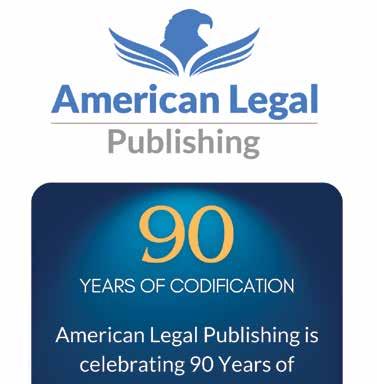
How does a city become an employer of choice in this tough environment? By creating an employee-focused culture that attracts and retains talented employees who deliver for the organization and the community. In other words, by becoming a great place to work.
The Ultimate Kronos Group Great Place to Work (GPTW) Institute has surveyed millions of employees in organizations around the world. For 30 years, GPTW has used its “trust index survey” responses to certify organizations as great places to work. These are organizations where at least 70 percent of employees respond positively to the trust index survey questions.
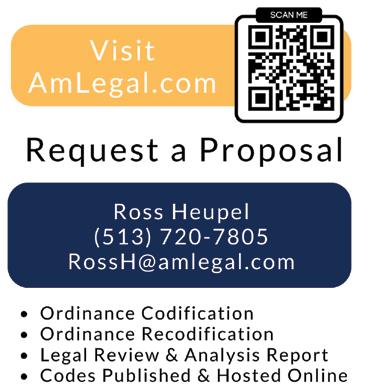

Employees in certified organizations feel far better about their workplaces than employees in the average U.S. organization. Places certified by GPTW have employees who report they promote their organization to friends and family (86% vs. 54% U.S. average), plan to work there for a long time (84% vs. 55%), believe their organization provides excellent customer service (89% vs. 66%), believe their organization innovates (82% vs. 49%), and are given the resources they need to do their job (82% vs. 52%).
It is no surprise, then, that the best places to work have 50 percent less turnover than other organizations. These organizations are able to meet the needs of the largest generation in the workforce—when millennials believe their organization has a high-trust culture, they are 22 times more likely to want to stay for a long time. A GPTW study showed that a whopping 98 percent of respondents said a great culture is important in their next job search.
In addition to boosting retention, city governments must hire the next generation of public servants. And what happens internally in an organization affects how people outside, including prospective job candidates, view it.
According to another survey, up to 69 percent of job seekers would reject a job offer from an organization with a bad reputation, even if they were unemployed.
How is an organization’s reputation created in our online world? A major source is job sites that prominently display employee reviews. According to Glassdoor, a leading site, 65% of its users read at least five reviews before forming an opinion about an employer. Another survey revealed that 55% of job seekers stop pursuing a job after reading negative reviews.
Organizations with five-star employee ratings will out-recruit organizations with one-star ratings.
Great places to work have great leaders. GPTW research has identified nine leadership behaviors that create a culture of trust.
Great listeners develop other critical behaviors. Listening is not just hearing what someone says – it’s responding. An inclusive leader shows humility, vulnerability, and empathy by considering other points of view while putting their own opinions aside.
Listening includes regularly surveying employees to understand their opinions — and then responding with action.
Speaking is about clarity, frequency, transparency, and sharing information through multiple channels — video, intranet, email, print, person-to-person, and in meetings. City leaders
FEB. 4 & 5, 2025
RIB DINNER | Feb. 4
Tasty ribs and essential info in an informal setting.
MUNICIPAL DAY | Feb. 5
Front row seat to the legislature in action.
iStock.com/Jag_cz

should especially strive to connect with front-line employees in jobs like law enforcement, firefighting, public works, parks and recreation, and public transit.
Leaders thank colleagues in personally meaningful ways that show them they are important. This can include peer recognition, employee awards, personal notes, viewing mistakes as learning opportunities, and recognizing employees in person and in front of others. Recognition should be sincere and meaningful. For example:
“We thank John for helping a resident through a sticky problem. At our city, we do whatever it takes to make the customer’s problem our problem, and then solve it. I also know that John was late for his daughter’s soccer practice. I hope he does not have to do that again, but we appreciate that he did that for us.”
A leader helps employees grow as people, not just as employees. This includes nurturing talents and interests through job- and non-job-related training, stretch assignments, educational support, and personalized development plans. Development also means providing candid and measurable feedback.
This is the secret weapon. Great work (and great retention) occurs when people feel they are being cared for. According to a national survey, 81 percent of employees want to work for employers that support their mental health. Caring also means providing workplace flexibility and work-life balance and helping people cope with family and personal crises.
In the private sector, sharing often means distributing profits and bonuses. In government, sharing can be ensuring that raises are fair or, if compensation is merit-based, that criteria and decisions are clear and transparent.
Most important is celebrating how people help the organization achieve its purpose. Government has a unique opportunity during Public Service Recognition Week, the first week in May when we celebrate the contributions of public servants nationwide.
City leaders don’t have to be great public speakers to inspire – they can inspire with the questions they ask and how they listen. Leaders also inspire by helping employees understand how their work helps the city deliver essential services.
This can be done through customer stories, sharing the organization’s vision, highlighting behaviors that demonstrate key values, reinforcing these values, and stressing the organization’s contribution to the community or society.
You only get one chance at a first impression, and that begins with timely and user-friendly hiring. Government hiring can take up to three times longer than the private sector. However, one local government – Nevada County, California – “threw out the rule book, ”streamlined hiring processes, and cut average hiring time from 136 to 28 days.
Cities must also welcome hires through new employee onboarding, an integrated set of activities that begins
before the new employee reports and continues throughout the new hire’s entire first year.
Thriving in our new and challenging workplace means creating a great place to work – a city government that attracts, develops, and retains the talented people who deliver for their residents. To do this, cities should:
• Survey employees to identify how to improve the employee experience – and then act on the results
• Market and brand city government jobs as opportunities to make a difference in the community
• Create timely and user-friendly hiring processes and effective onboarding
• Help leaders develop the competencies that create great places to work
The UKG Workforce Institute Industry Insights Report, Public Sector Edition, offers further insights on how to thrive in the new world of work. It can be found linked in the original posting of this article at https://www.nlc.org/ article/2024/10/21. ■
The South Dakota Municipal League has announced that Google Groups, the email networking platform used by several affiliate associations, will no longer be available for use after Dec. 31, 2024.
SDML Director of Member Engagement Jessica Carr says Google has ended support for several aspects of the application, which has impacted use over the past year.
Members are instead encouraged to use the forum feature of the SDML membership platform, which allows them to interact and pose questions among colleagues.
“We are excited to offer the forum feature of our membership platform as a tool for our affiliate groups and municipalities to connect with one another,” said Carr. “Being able to network with one another and utilize the forums as a resource to problem solve, connect, and have conversations is something we look forward to utilizing for quite some time to come.”
To access the affiliate forums, log in to your profile on the SDML website. Using the ‘Groups’ tab in the top banner, select the affiliate you would like to engage with. Once at the affiliate page, you’ll have access to the forums. Ensure that a forum doesn’t already exist with the same topic, at which point you can then create a forum topic and thread to share with the group. Posts should be on topic, concise, and provide value or aim to answer questions that others may have encountered.
Affiliate forums are only accessible by current members and are not able to be viewed by the public.
For assistance with forums, or to help set up your profile, please contact Jessica at Jessica@sdmunicipalleague.org or call (605) 224.8654. ■
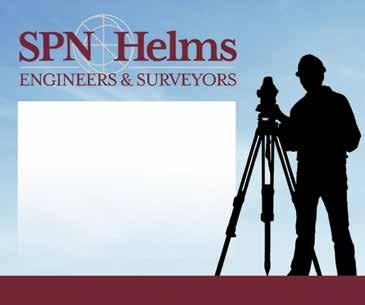

Each year, the National Civic League honors ten outstanding communities with the All-America City Award, celebrating excellence in local innovation, civic engagement, and crosssector collaboration. This prestigious award highlights the remarkable potential within communities to address critical issues and drive meaningful change when residents, businesses, and nonprofit and government leaders work in concert.
As communities grapple with the challenges of climate change, the 2025 All-America City Award will recognize the pivotal role that community engagement plays in advancing environmental sustainability. Climate change presents imminent and complex dangers to local communities. Urgent and equitable
action is needed to help forestall rising temperatures and cultivate resilient, equitable communities that continue to thrive in the face of these environmental, economic, and social impacts. Fortunately, communities all over the world are already working to help safeguard our planet for future generations.
The 2025 award will recognize these communities, specifically those that demonstrate a commitment to environmental sustainability through meaningful community engagement initiatives. By engaging residents, businesses, and government stakeholders in the pursuit of environmental goals, they create lasting impacts that reduce and mitigate the effects of climate change while bolstering residents’ well-being.
Communities from around the country will submit extensive applications outlining their efforts related to the year’s theme and describing their civic capital. An external review committee will select twenty fi nalists based on the criteria of shared vision, civic engagement, inclusiveness and equity, collaboration, innovation, and impact.
Finalists will then assemble teams to come to Denver for the annual AllAmerica City Award Event where they will share ideas, learn from experts, build connections, and present the story of their work to a jury of civic leaders. The 10 winners will be announced during the closing ceremony.
The application can be downloaded at www.nationalcivicleague.org. Letters of Intent are due Dec. 30. Applications are due Feb. 27, 2025. ■





DOUGLAS R. WERMEDAL | FORMER CITY COUNCILMAN
Volga is positively bustling these days.
Volga’s retail base has added three national franchises in just a ten-year span (Ace Hardware, Dollar General, and Subway). Locally sourced growth is robust as well with Bank Star opening a new 4,700-square foot facility and Legends Diner & Sweeterie, a former grocery store location, being renovated into a diner, catering kitchen, and ice cream shop, to open in 2025.
Ambitious municipal infrastructure improvements have occurred with the construction of a $4 million water tower/well field project.
Sioux Valley Schools are performing well academically, scoring above the state average in English, math, and science. Perhaps most notably, the 2024 South Dakota Teacher of the Year, Amy Verhelst, does her teaching in a Sioux Valley classroom.
Municipal managers have tried to determine the secret to Volga’s success. Is it Volga’s vital retail environment? Is it the growth-friendly municipality creating infrastructure for success? Is it the school’s positive impact on students? Each of these are contributing factors to the Volga success story, but the true secret is. . . wait for it. . . really good pie.

is power. Pie convenes community decision makers. Pie will get a fastmoving family to slow down and connect. The kind of pie baked fresh daily by Christina Wiemer, owner of the Valley Restaurant on Volga’s east side.
“I strive in my business to be a place that brings community together and there is no better way than over a slice of pie!” says Wiemer.
Most purveyors of pie will offer the same standard apple, blueberry, and cherry. While these flavors are delicious, it can be limiting to color with the only the same three crayons constantly in the box. Volga’s Valley Restaurant has at least a dozen different pie choices every darn day.
The choices are so numerous that the waitresses gave up trying to remember






them all. Instead, if you order pie the waitress will bring a dry erase board to your table. This board will have the roster of the current pie population along with hash marks indicating how many slices remain. You can track a pie’s popularity by the smudgy erase marks reducing the slice tally.
For example, the pie choices as I pen this include peach, butterscotch, pecan, banana cream, key lime, pumpkin, peanut butter, coconut cream, raspberry cream, sour cream and raisin, chocolate meringue, and the usual apple and blueberry. Plus, no less than three kinds of rhubarb-based pie. Rhubarb never had it so good.
Come for the pie, stay for the people: Volga, South Dakota. ■

MADISON, S.D. – Dakota State University (DSU) and South Dakota Attorney General Marty Jackley recently announced the hiring of Mike Waldner as director of the newly established Municipal Cybersecurity Grant Program.
This initiative, funded through Senate Bill 187, will enhance the cybersecurity infrastructure of South Dakota's municipalities by providing secure email solutions, technical support, risk assessments, and specialized training to strengthen defenses of local governments against cyber threats.
Municipalities nationwide are increasingly targeted by cyberattacks, and South Dakota’s communities are not immune to this trend. In 2023, the Center for Internet Security reported a 51% increase in ransomware incidents targeting state and local governments, underscoring the urgent need for enhanced cybersecurity measures.
The South Dakota Attorney General’s Office, under Senate Bill 187, was given oversight of this grant program, and
Attorney General Jackley underscored the significance of this initiative.
“Cybersecurity is vital for the safety and security of our communities. We look forward to working with DSU and Mike Waldner to ensure that every municipality in our state has the resources it needs to defend against cyber threats. This program is an important step toward making South Dakota a model of cybersecurity for the nation,” Attorney General Jackley said.
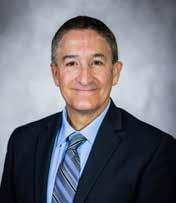
DSU President José-Marie Griffiths highlighted the program’s importance, saying, “Dakota State University is at the forefront of cybersecurity education and research, and this grant program exemplifies our commitment to serving South Dakota. Mike’s leadership and expertise will be instrumental in safeguarding our state’s public infrastructure, and I look forward to seeing the positive difference he and the program will make."
South Dakota District 8 Senator Casey Crabtree, who sponsored the legislation, added, “Strengthening our municipalities' cybersecurity is crucial for the resilience of our state's infrastructure. This program, led by the Attorney General’s Office and DSU, will provide essential resources and support to protect our communities from evolving cyber threats. It’s a significant advancement for South Dakota’s cybersecurity. Mike has a tremendous background in state government, I am confident he will lead this program well.”
Waldner has had pivotal leadership roles in many programs throughout the state, including the efforts to install the state’s first internet connection and create the state’s internet presence, the K-12 Data Center Project, FirstNet (law enforcement network), and ConnectSD broadband initiative.
He began his new position on Nov. 18, and shared his commitment to the program’s mission.
“It’s a privilege to be part of this initiative that will have a real impact on the security of South Dakota’s communities. I am honored to lead this effort and look forward to working with partners across the state to strengthen our cybersecurity posture,” Waldner said.
The Municipal Cybersecurity Grant Program is supported by an advisory council comprising experts from various sectors:
State Agencies
• Consumer Protection, Jody Gillaspie
• Secretary of State, Monae Johnson Dakota State University
• Ashley Podhradsky, VP Research and Economic Development
• Arica Kulm, Director of Digital Forensics, Leader of Project Boundary Fence Law Enforcement
• SD Sheriffs Association, Staci Ackerman
• Dave Ackerman, Sheriff Counties and Municipalities
• South Dakota Association of County Commissioners, Eric Erickson
• Minnehaha County, Monte Watembach
• City of Pierre/Hughes County, Craig Waldron
• City of Sioux Falls, McKenzie Hermanson
• Executive Director, South Dakota Association of County Commissioners, Kris Jacobson
• Lawrence County, Greg Dias
• Brown County, Pat Wolberg
• South Dakota Municipal League, Sara Rankin
• South Dakota Association of Rural Water Systems, Jeremiah Corbin
Federal Cybersecurity
• Cybersecurity and Infrastructure Security Agency, Jim Edman
Statewide Cybersecurity Industries
• SBS CyberSecurity, Chad Knutson
• Golden West, Eric Eisenbraun
• Servos, Pat Snow
This broad coalition will work closely with DSU to prioritize and address the cybersecurity needs of South Dakota’s communities, helping to build a safer digital landscape for all residents. ■




PIERRE, S.D. – The South Dakota State Historical Society announced that applications for the first round of the 2025 Deadwood Fund grant program are due on Feb. 1, 2025, for work beginning no earlier than May 1, 2025.
Grant forms are available online at https://history. sd.gov/preservation/fundingopportunities.aspx.
The program is designed to encourage restoration or rehabilitation of historic properties by individuals, organizations, or public agencies.
Grants will be awarded in amounts ranging from $1,000 to $25,000. The grant amount must be matched at least on a dollar-for-dollar basis from nonfederal and nonstate sources. Nonprofi t organizations will be allowed to use in-kind services for one-half of their match.
Funding for the program is from Deadwood gaming revenue earmarked by state law for historic preservation projects throughout the state and distributed by the State Historical Society.
The second round of 2025 applications will be due Oct. 1, 2025.
For more information on the South Dakota State Historical Society’s Deadwood Fund grant program, contact the State Historic Preservation Office at 605773-3458 or email shpo@state.sd.us. ■



LYNN BREN | SDPAA EXECUTIVE DIRECTOR
Change happens to us regardless of our readiness to manage the stressors that accompany change. As we’ve discussed in the past, change isn't bad, and as long as we are prepared, the stress that may accompany change doesn’t have to negatively affect our lives or our entity’s work flow.
The holidays compound the seasonal change that we are starting to experience during this time of year here in South Dakota. Many of us (or our friends) pour over the various apps, websites, and of course the good old Farmer’s Almanac to see if we can figure out when and how much snow we may see, or if it’s going to be a bitter cold season, or if we’ll witness our middle
school aged children sporting shorts throughout this school year. While we do this on a personal level, it’s likely that we are keeping in the back of our minds what impact the information we are researching will have on our day-today work lives as well.
While we may be trying to schedule various holiday parties and gatherings, many of our community leaders are also factoring in the impact that the weather and the major upcoming holidays may have on workloads and deadlines. Consideration must be given to not only how the budget may be impacted, but also what additional increases may be required as the weather begins to change. Supervisors


and superintendents alike are balancing the needs of their staff to be able to spend time with their loved ones over the holidays versus the needs of their departments to have sufficient staff available to address weather related issues.
The change of seasons brings not only changing weather conditions, but we also see many people’s health change simply due to less time in the sun. The days are getting shorter as we sneak closer to the winter solstice. While the daylight time is shorter, our task lists don’t seem to shrink as quickly as the sunshine! These types of changes impact all levels of the team, not just those who are accountable for staffing
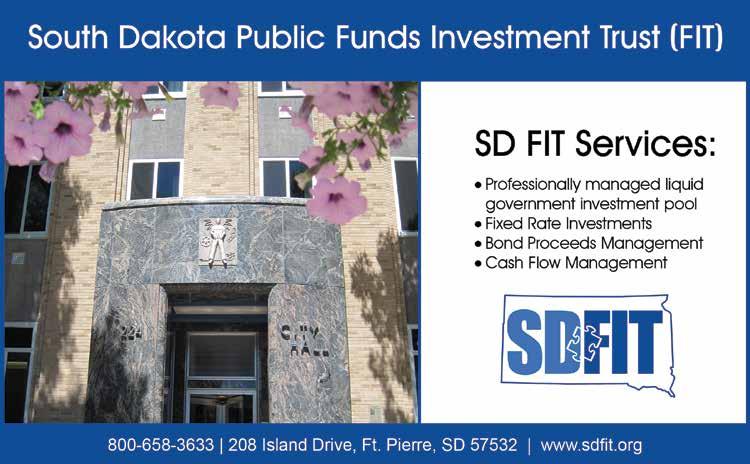
and budget constraints. The end result creates one of the most pressing challenges for employers across the nation, not just here in South Dakota: How do we help our staff identify and manage their stress?
While some stressors are rather obvious, it’s helpful to talk about them again. We mentioned a second ago that the holidays create a challenge for supervisory staff to try to best meet the time-off requests of staff while balancing the staffing requirements or expected requirements during the holiday season. We often times fail to recognize however that those on our team are facing similar challenges within their own individual teams and families. Many times, our team members are forced to try to balance work schedules and with personal holiday plans. Our team members recognize the potential increase in emergencies and service needs during the holidays, but sometimes family and friends may not be so understanding.
South Dakota public libraries connect communities through knowledge, imagination, and opportunities.
In 2023, local residents and travelers visited South Dakota public libraries 2.6 million times.
That’s more visitors than Mount Rushmore (2.4million)!

Data based on SDSL’s South Dakota’s Public Library Survey, 2023
library.sd.gov
SDML-2024.indd 5 11/04/2024 1:38:49 PM
In an effort to help reduce the effects of stress in the work place due to seasonal change and the holidays, we recommend reminding your team of resources and tools that are available to help them navigate these holiday seasons. Self-care resources may include practicing mindfulness (or self-awareness), taking a few moments out of the day to reflect on things that are going well (many times we need to be very intentional about these thoughts), and meditation. Using breathing exercises during the time of reflection and mediation will help eliminate stress from one’s physical body and will help calm the mind so that they can focus on the changes and stressors that are wreaking havoc on their day.
I think we can all agree that we are what we eat, and when we eat well, we feel well. Stressing good nutrition and equally important, good hydration in these winter months will increase our body’s ability to fight off the effects of stress in our lives. Encouraging our teams to participate in physical wellness activities such as balanced diets and getting enough sleep and exercise helps to create a team built for success.
Time management, or lack thereof, will increase the impact that our seasonal stress will have on our team. As our task lists become longer, we must rely on our ability to prioritize and set reasonable and realistic expectations for ourselves and our team. It is important to ensure that we, and our teams, are setting appropriate boundaries and taking breaks. This includes making sure that we have a proper work / life balance. If there is an imbalance, we are going to lose those valuable employees. Stress the importance to your team of these points so that they can begin to take control over their own time, and their work / life balance. One way to emphasize the importance of physical wellbeing may be to create holiday fitness or wellness challenges to generate awareness.
Mental health is just as important as physical health. These two parts of your being work together to make you the best you can be. Remind your staff of any additional resources that you may offer such as any employee assistance programs or
other mental health resources in your community. Encourage participation in informal peer support networks and recognize that work friendships are also effective tools for helping to recognize and manage stress. I like to remind everyone at various trainings and meetings that I’m at, usually the best information you come away with from formal events is gleaned from the information marketing time spent with others in your area. Your team can use this same philosophy when considering various struggles – time management, budgetary needs and concerns, work demands, or even how to start a work out plan to get ready for the new year!
In an effort to keep strong teams strong and build up other teams it’s important to encourage a work culture that acknowledges the stress that is created through changing work schedules coupled with seasonal changes and demands. Anticipating the increased demand for time away from the work setting and preparing your team for the potential disappointment related to denied time off requests and the need for potential overtime or after-hours emergency calls can be helpful in offering them the ability to reduce the impact that stress may have. Additionally, for all team members, it’s important to set clear goals and priorities as we come to the end of the year. Nothing creates havoc faster than an unexpected task or an urgent request that could have been avoided with some pre-planning and communication with your team. Collaborating with your team to set clear and achievable goals during this time of exceptional stress will help balance the increased demands your team may be facing.
While we know that the stress due to the seasonal change and holiday season is inevitable, we can come out at the other side successful, and with a team that appreciates the foresight and acknowledgment of what they may be going through. A healthy team is a happy team, and a happy team is a successful team. If you’re curious about what training opportunities that may be available through the SDPAA’s online learning systems, head over to the training pages. If you don’t find what you’re looking for, let us know, we’ll see what we can do to find the right resource to help you make your next safety or staff meeting less stressful! Cheers for a safe and happy holiday season! ■
When Safety Benefits, Inc. (SBI) conducts loss control surveys on behalf of the SMDL Workers Compensation Fund (SDML WCF) and South Dakota Public Assurance Alliance (SDPAA), one topic frequently discussed with Members is the importance of having a safety committee.
When SBI loss control consultants ask if an entity has a safety committee, a wide variety of answers are given: No, we don’t have enough employees. No, we don’t have the time. No, we don’t
know how to do that. Yes, but we don’t meet as often as we probably should. Yes, but no one wants to be on it. Yes, but we don’t have a budget so we can’t get anything accomplished. Yes, but we really don’t know what we’re doing. And sometimes . . . Yes, we have a very active safety committee!
Regardless of where your entity is in the process of establishing, improving or continuing a safety committee, it is important to know that effective safety committees can reduce workplace

injuries and promote a culture of safety in the workplace.
What is an effective safety committee? Safety committees vary from place to place depending on the entity’s size, the services provided and employee job responsibilities. But one of the keys to success is involvement/representation from all levels of the organization. Even when employees are very involved they might be limited from taking action to do things like eliminating hazards, purchasing personal protective

equipment (PPE), or providing safety training if management isn’t involved. Management support of a safety committee through budget and time is essential. It must be a top down commitment.
Tasks common to safety committees include:
• Conducting regular documented workplace safety inspections to identify hazards (inspecting equipment, facilities, and work processes)
• Reviewing general injury information to identify trends and reduce workplace injuries
• Conducting job hazard analyses
• Coordinating emergency response activities like fire drills and severe weather drills
• Ensuring that safety data sheets (chemical information) are up to date and accessible to all employees
• Training employees on various safety topics, including the entity’s existing policies and programs
It can be overwhelming to consider all of the potential responsibilities of a safety committee at once. So, let’s look at just one of the items noted above. How might a safety committee assist in reducing workplace injuries? One way is to review information from injuries that have occurred. Determine if there are any trends – Have multiple employees been injured doing the same task? Are injuries more frequent in one department versus others? Are injuries more common at a particular time of day? Has one employee sustained multiple workplace injuries? Having answers to these questions can help guide the actions needed to prevent the injury from happening again.
Unsure how to create or reenergize your safety committee? Perhaps your entity has an effective safety committee, but you are always looking for ways to improve. That’s where SBI can help! We are developing a Safety Committee Toolkit to assist Members in all of these areas.
Coming in 2025, the Safety Committee Toolkit will include information and guidance like the following:
• Safety Committee Guidelines/By Laws
• Suggested Committee Responsibilities/Tasks
• Meeting Log/Minutes
• Injury Prevention & Incident Investigation
• Near Miss Reporting
• Job Hazard Analysis
• Suggested Training Topics and Training Resources
We look forward to working with you to establish an effective safety committee for your entity. The Safety Committee Toolkit will be available in print form and on the SBI web site. In addition to the information packet, SBI will be available to go on site and assist those Members wanting a little more guidance in setting up a new or refreshing an existing safety committee.
Stay tuned for more in 2025!
For questions regarding this article, please contact Safety Benefits, Inc. at 888-313-0839 or 605-334-9567. ■

‘TIS THE
SDML Workers’ Compensation Funds Pilot Program to Prevent Slips & Falls
SDML WCF data shows that nearly 25% of claims originate from slips and falls. Does this sound familiar? Are you interested in taking action to prevent employee injuries from slips and falls this winter? You might qualify for free winter safety footwear for employees! Contact Safety Benefits, Inc. at 605-334-9567 or 1-888-313-0839 for more information.





SUSAN T. RASMUSSEN | ATTORNEY, WOODS FULLER
This summer, South Dakota received a presidential disaster declaration due to the historic 1,000-year flooding event that occurred between June 16 and July 8, 2024. Four counties qualified for individual Federal assistance for residents and business owners. Landowners outside of those counties, however, may be looking to their municipalities to reimburse them for the damage caused to their homes and businesses by the extreme flooding this summer.
Such claims have been previously brought before South Dakota courts as “inverse condemnation” suits, which are eminent domain proceedings initiated by the property owner, rather than the government condemnor. See e.g., Hamen v. Hamlin County, 2021 SD 7, ⁋ 18, 955 N.W.2d 336, 336. Landowners whose property is taken for public use, or whose property is damaged through the taking of other property for public use, may recover compensation under the damages clause of Article VI of the South Dakota Constitution. Id. at 344.
The South Dakota Supreme Court has addressed inverse condemnation suits between private landowners and public entities specifically in the context of floodwaters in multiple instances. Such instances are usually limited to claims for damage to property by the government’s use or taking of land adjacent to the landowner’s property, rather than an outright taking of the property. In such cases, the landowner must show that the public entity took and used another property that was located in such a way as to cause damage to the landowner’s property. Krier v. Dell Rapids Twp., 2006 SD 10, ⁋ 21, 709 N.W.2d 841, 847. Additionally, the resulting injury must be peculiar
to the owner’s land, and not of a kind suffered by the public as a whole. Id.
For example, in Smith v. Charles Mix County, the landowner’s farm property ran alongside a highway. 182 N.W.2d 223, 223 (SD 1970). About one mile from the property, a creek crossed the highway. Id. An unusually heavy rainfall caused the creek to rise, and overflow water not only filled the ditch, but also flooded the land on the other side of the highway from the landowner’s property. Id. at 224. To save the highway grade, the county installed culverts under the highway, releasing the floodwater, which had been impounded on one side of the highway through to the other side, resulting in flooding of a portion of the landowner’s property. Id. The South Dakota Supreme Court upheld an award of damages to the landowner for the flood damage to his property, and stated that, in the maintenance of highways, a public entity “cannot divert surface waters into unnatural watercourses or gather water together in unnatural quantities and then cast it upon lower lands in greater volume and in a more concentrated flow than natural conditions would ordinarily permit.” Id.
On the other hand, the Second Circuit Court in Minnehaha County found in Riedemann v. City of Sioux Falls, et al. that the landowner failed to show that the City caused or increased unnatural flooding of their land. 49CIV19-157, Memorandum of Decision, 13. Although this is a trial court decision and not a binding Supreme Court ruling, the trial court provided a good summary of the existing precedent and drew conclusions that suggest how other courts may respond. In Riedemann, the landowner specifically tried to base

their claim on the City’s lack of earlier action to prevent flooding of their property, as the City had undertaken a drainage improvement plan only after significant flooding damage had occurred. Id. However, the court found that a requirement of a deliberate governmental action, rather than mere inaction or delayed action, for recovery on inverse condemnation claims, aligns with South Dakota precedent. Id. at 14.
Ultimately, the circuit court concluded that, “[t]o permit a recovery to Plaintiffs through inverse condemnation in this case would be to make the City an insurer of its citizens against flooding, strictly liable to all landowners who suffer flooding and assert that the City’s general involvement, lack of action, or delayed action in urban development, roadway maintenance, and storm drainage has somehow resulted in their property being flooded.” Id. at 15. This would, of course, be an unreasonable burden to place on a city, and the courts have established clear principles for when City action constitutes a taking, resulting in damages to a landowner, and when it does not. ■
PIERRE, S.D. – South Dakota Attorney General Marty Jackley has released the final ballot explanation for a proposed 2026 initiated measure that would limit annual property tax assessment increases for non-agricultural property. The ballot explanation can be found here.
Attorney General Jackley is not responsible for the language of the measure and takes no position on the proposal. State law requires the Attorney General draft a title and explanation for each initiated measure, initiated constitutional amendment, constitutional amendment proposed
by the Legislature, or referred measure that may appear on an election ballot.
The proposed measure is sponsored by Joe Hurley of Sioux Falls. This proposed initiated measure would limit annual property tax assessment increases on all non-agricultural land to no more than 2.25 percent of a base amount. If the measure is approved by voters, the new limit would start with the 2027 assessment.
Attorney General Jackley's explanation is meant to be an "objective, clear, and simple summary" intended to "educate

the voters of the purpose and effect of the proposed" measure, as well as identify the "legal consequences" of each measure. Attorney General Jackley has provided a fair and neutral explanation of the initiated measure to help assist the voters.
The initiated measure would require 17,509 valid petition signatures to qualify for the 2026 general election ballot.
For more information regarding ballot measures, please visit the Secretary of State’s website. ■
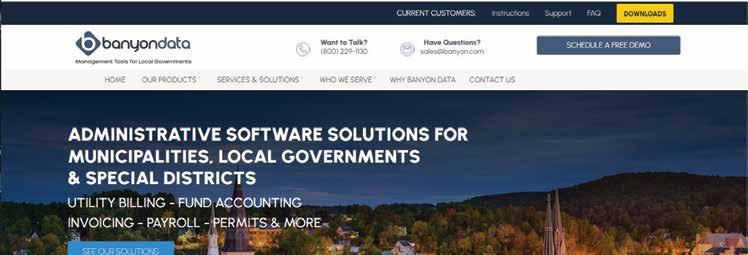

Trenching and Confined Space Entry Safety Equipment Grant, SDML Workers' Compensation Fund
All-America City Award, The National Civic League
Due: Feb. 27
Honors ten outstanding communities, celebrating excellence in local innovation, civic engagement, and cross-sector collaboration. Highlights the remarkable potential within communities to address critical issues and drive meaningful change when residents, businesses, and nonprofit and government leaders work in concert.
Learn more/apply: www.nationalcivicleague.org
Disaster Water Grants Program, US Dept. of Agriculture
Due: Applications accepted until funds are exhausted Helps eligible communities pay expenses related to damages to rural water systems as a result of Presidentially declared disasters that occurred Jan. 1-Dec. 31, 2022. Examples of items that may be covered are roofs and generators.
Learn more/apply: www.rd.usda.gov; Alison Larson at 605.655.3516 or alison.larson@usda.gov
Stan Houston ICS Saw Grant, SDML Workers' Compensation Fund
Due: Opens Jan. 1, awarded first-come, first-served Provides funds towards purchasing saw packages to reduce risk of injury during activities that require the use of a chop saw. Applicants must be a member of the SDML Workers' Compensation Fund. See grant application for full details.
Learn more/apply: www.sdmlwcfund.com
Stryker EMS Equipment Grant, SDML Workers' Compensation Fund
Due: Opens Jan. 1, awarded first-come, first-served Provides funds towards purchasing equipment to provide a safer workplace for employees that assist in emergency transfer of patients. Applicants must be a member of the SDML Workers' Compensation Fund. See grant application for full details.
Learn more/apply: www.sdmlwcfund.com
Due: Opens Jan. 1, awarded first-come, first-served Provides funds towards equipment to mitigate the risks of trenching and confined space entry. Applicants must be a member of the SDML Workers' Compensation Fund. See grant application for full details.
Learn more/apply: www.sdmlwcfund.com
Preservation and Rehabilitation/Replacement
Bridge Improvement Grants (BIG), SD Dept. of Transportation
Due: Jan. 2
Provides local governments funds to preserve, rehabilitate, and reconstruct bridges on their local roads. Requires a 20% local match. Municipalities who own and maintain bridges, as well as counties that have implemented a wheel tax are eligible. Learn more/apply: https://dot.sd.gov
Deadwood Fund Grant, SD State Historical Society Due: Feb. 1 annually. Fall session due Oct. 1 annually. Awarded in amounts ranging from $1,000 to $25,000 to encourage large-scale restoration or rehabilitation of historic properties. Learn more/apply: https://history.sd.gov/ preservation/fundingopportunities.aspx
Hazard Mitigation Grant Program, SD Office of Emergency Management Due: May 30
Available for local governments and certain privatenon-profit organizations to apply for hazard mitigation projects. Funding will first be prioritized in the areas declared a major disaster following the flooding event in SD from June 16 to July 8, 2024. Learn more/apply: https://dps.sd.gov; Jim Poppen, 605-773-3231 or jim.poppen@state.sd.us
Street Maintenance Training Scholarship
Due: Jan. 15
Provides funds for several association members for continuing education in either the Public Works Training or Technical School Course categories. Learn more/apply: www.sdmunicipalleague.org/ StreetMaintenance
Election Training
Webinars. Six separate sessions: Dec. 5 & 12; March 10, 12, 19, & 26
Registration: Free, pre-registration not required
Multiple sessions assist officials in conducting municipal or school elections. Attend the individual sessions that interest you. Topics for each webinar available to view online. New finance officers and business managers are encouraged to attend all webinars. Sponsored by the Secretary of State's office, Associated School Boards of South Dakota, and the South Dakota Municipal League.
Learn more/register: www.sdmunicipalleague.org/ events
Concrete Paving Certification Course, SD Dept. of Transportation
Dec. 10-12, Pierre
Learn more/register: https://sdlearn.csod.com
Annual Report Workshops
Webinars: Jan. 15 - Large Cities, Cash Basis | Jan. 16Large Cities, GAAP Basis | Jan. 22 - Small Cities
Registration: Free
Due: One week prior to each session
Provides guidance on compiling required municipal annual report forms. Held in conjunction with the SD Department of Legislative Audit.
Learn more/register: www.sdmunicipalleague.org/ events
Aggregates Certification Course, SD Dept. of Transportation
Five sessions: Jan. 6-9; Jan. 13-15; Jan. 27-29; Feb. 3-5; March 3-5, Sioux Falls
Learn more/register: https://sdlearn.csod.com

Does your community need a ordable housing?
South Dakota Housing provides solutions for you.
Soils Certification Course, SD Dept. of Transportation
Five sessions: Jan. 8-10; Jan. 15-17; Jan. 29-31; Feb. 5-7; March 5-7, Sioux Falls
Learn more/register: https://sdlearn.csod.com
Concrete Plants Certification Course, SD Dept. of Transportation Jan. 21-23, Pierre
Learn more/register: https://sdlearn.csod.com
Erosion and Sediment Control Certification Course, SD Dept. of Transportation
Three sessions: Feb. 4-5; Feb. 19-20; Feb. 25-26, Pierre
Learn more/register: https://sdlearn.csod.com
Structures Certification Course, SD Dept. of Transportation Feb. 10-13, Pierre
Learn more/register: https://sdlearn.csod.com
Contract Administration Core Curriculum, National Highway Institute Feb. 19-20, Rapid City
Learn more/register: https://www.nhi.fhwa.dot.gov


















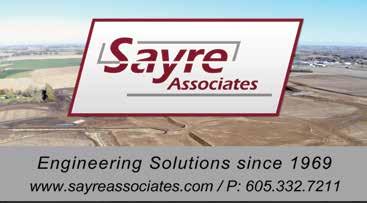
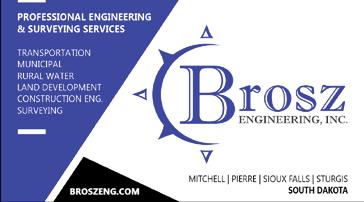












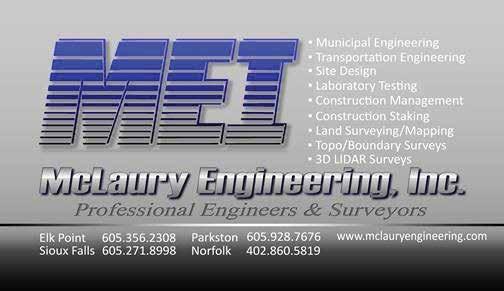































Over the past four years, Americans have been burdened by the results of the Biden Administration’s policies, like an unsecure border, high inflation, mandates that are increasingly difficult to meet for energy production, vehicle emissions, health care, firearms, and more.
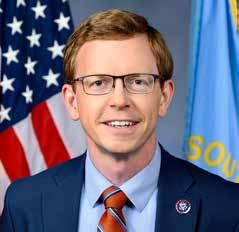
When I travel around South Dakota, the one comment I hear from most people is they are struggling to make ends meet due to high prices. Since President Biden took office, I have voted against more than $13 trillion in progressive spending. Unfortunately, those spending plans passed with Democrat support and handed the bill to American families who are now paying more than $13,000 per year to buy the same goods, compared to four years ago. The President and Congress cannot spend beyond our means.
I’m optimistic for change. Beginning in January 2025, Congress and the Trump Administration will begin to put conservative policies back in place. We’ll work to secure the border, restore fiscal sanity, extend tax cuts, bolster our energy security, and more to ease the burden felt by families and corporations.
Here are a few things I’m looking forward to in 2025:
Border security: More than ten million illegal immigrants have entered our country since January
2021. It’s time to finish the border wall, increase Border Patrol, and reimplement Trump-era policies like Remain in Mexico to prevent more individuals from entering illegally.
Fiscal sanity: Congress and the White House must work together to cut unnecessary federal spending. I’ve worked with Members of Congress to pass a spending package that cut spending for the first time in over a decade. While it didn’t bring the budget to where it needs to be, there is power in incrementalism, and I look forward to making more targeted cuts to government spending.
Extend tax cuts: The Tax Cuts and Jobs Act of 2017, championed by President Trump, brought relief to many American families. In anticipation of the expiration of these tax cuts at the end of 2025, I voted for the Tax Relief for American Families and Workers Act to extend family- and businessfriendly parts of the TCJA. I anticipate working with the Trump Administration to extend more of the provisions in the TCJA to provide needed relief to families.
Bolster energy security: The Biden Administration took strong opposition to energy production like oil, gas, and nuclear. We must have an allof-the-above energy approach – nuclear, solar, oil, wind, gas, and more – to bolster America’s energy security and keep prices lower. In the next Congress, I’m expectant to pass policies that encourage domestic energy production in the U.S. that will help grow our economy.
I’m expectant for a conservative House, Senate, and White House, that are aligned on policies to improve our economy, lower prices for families, and make America a safer place. ■
Airport ARFF/Operations/Maintenance Crew Supervisor – City of Pierre, SD. Responsible for providing general daily oversight of airside operations to include safety inspections, pavement and electrical inspections, maintenance and repair to assure compliance with FAR Part 139 certification requirements, monitoring overall airfield safety, maintaining records, and for ensuring compliance with all regulations involving ARFF personnel, fire & rescue response, hazardous material storage on the airport and performing airport operations and maintenance duties. Maintains documentation and records of all actions taken to ensure compliance with FAR Part 139 certification requirements. Wage offer will be based upon actual education and experience. Comprehensive benefit. Up to $2000 annual educational assistance available. Learn more and apply at www.cityofpierre.org. Open until filled.
Aquatics Director, Evans Plunge Mineral Springs – City of Hot Springs, SD. Responsible for technical and administrative work that involves overseeing the safe and effective operation of buildings, facilities and equipment with primary emphasis on the swimming pools, hot tubs, and health club amenities at Evans Plunge. Work involves management of the lifeguards and slide dispatchers. Work will regularly involve providing lifesaving assistance, ensuring the safe use of the pool facilities, and safeguarding the conduct of pool patrons. Wage: DOEQ-$20.53-TOS. Competitive benefits. Complete a City of Hot Springs Job Application. Resume & cover letter are encouraged. Applications can be sent to Kari MulockFacility Director, or dropped off at City Hall 303 N River St. Hot Springs, SD. Open until filled.
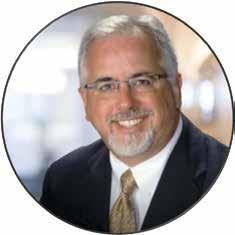
Building Inspector – City of Spearfish, SD. Inspects residential, commercial, and industrial structures within the City of Spearfish and its various jurisdictions to ensure compliance with state and local building codes. Starting salary for this position depends on the number of certificates the candidate possesses. Grade 17$27.81. Grade 18 - $29.22 (possession of two or more certificates). Learn more and apply at https://cityofspearfish.criterionhcm.com/ jobs/443/1. Open until filled.
Building Services Code Consultant/Plans Examiner – City of Rapid City, SD. Responsible for administering the compliance of codes, rules, and regulations governing the building construction industry, including the International Building Code, International Residential Code, International Existing Building Code, and ANSI codes and standards, and to supervise and coordinate Building Inspection staff. Salary: $61,363.76 - $82,159.53 annually. Competitive benefits. See full description at https://www.governmentjobs.com/careers/ rapidcity. Open until filled.
City Administrator - City of Credit River, MN. As the Chief Administrative Officer of the City, the City Administrator provides leadership to the City staff and helps the City Council to define, establish, and attain overall goals and objectives of local government. Salary: $116,000 to $145,000 (Hiring Range: up to $130,000). View the full job description at https://www.ddahumanresources.com/ active-searches. Direct any questions to Liza Donabauer at liza@ daviddrown.com or 612-920-3320 x111. Closes Dec. 17.
City Administrator – City of Hot Springs, SD. Assumes full responsibility for planning, administering, directing, overseeing


EXPERIENCE

Land Surveying / Utility Analysis & Design / Landscape
Architecture Street Design/ Agricultural Engineering / Water/

801 N. Phillips Ave., Ste 100 / Sioux Falls, South Dakota
201 Walnut Street / Yankton, South Dakota
LOCAL EXPERTS IN 605. 338. 6668 / 605.665.8092 / stockwellengineers.com

and evaluating the activities and operations of the City of Hot Springs. Provides policy guidance to and coordinates the activities of management staff; facilitates the development and implementation of long and short range plans, policies, goals, objectives and programs to provide the City with technical and administrative direction in meeting and maintaining City services standards; ensures public services are delivered in an efficient and effective manner; responds in emergency management situations and provides complex administrative support to the Mayor and City Council including implementing policy decisions made by the City Council. Wage: $25.30 - 31.63/ hr. TOS, or $52,625 - $65,790 DOEQ. Competitive benefits. Open until filled.
City Administrator - City of Sturgis, SD. The City Administration is the chief administrative officer of the City, responsible to the Mayor for the administration of all City affairs placed in the City Administrator’s charge by SMC Title 7 and City resolutions. Salary: $130,000 to $145,000, depending on applicable, verifiable qualifications and experiences. Annual performance bonus plus benefits. Learn more and apply at www.sturgis-gov.com/jobs. Closes Dec. 4.
City Administrator/Clerk/Treasurer - City of Crosby, MN. As the chief administrative officer of the City, provides leadership to the City staff and helps the City Council to define, establish, and attain overall goals and objectives of local government. Manages operations of the City, provides financial oversight, is responsible for supervising all City staff and consultants, and manages all functions directly or indirectly through the department heads. Also assumes the statutory duties of Clerk and Treasurer and is responsible for delivering quality service to citizens in compliance with all legislative,
judicial, and administrative obligations established by higher authority. Salary: $91,395 to $118,809. Full description at https:// www.ddahumanresources.com/active-searches. Closes Dec. 15.
City Attorney – City of Pukwana, SD. Town of Pukwana is looking for legal representative. Pukwana sells utilities (sewer/water/ electric) and has recently expanded. Board has purchased 80 acres of cropland adjacent in city limits. Looking to develop. We are in need of a town lawyer. All efforts to stay local have come up empty handed. Please drop us an email: townpukwana@midstatesd.net or call the office 605.894.4316. Pukwana might not make ya' "rich" but we can work on making ya' "famous." Open until filled.
Communications Officer – City of Pierre, SD. Work as part of a team operating the Central South Dakota Communications Center, the 911-Emergency Dispatch Center for central South Dakota. Receiving calls for assistance from the public, document and dispatch appropriate public safety personnel for those calls. Receive, process and send radio communications for various Law Enforcement Agencies, Emergency Medical Services, and local Fire Departments. 40 hours per week - Shift work. Comprehensive benefit package. UP TO $3000 HIRING BONUS! Learn more and apply at www.cityofpierre.org. Open until filled. EOE.
Communications Officer - City of Spearfish, SD. Responsible for performing emergency and non-emergency communications functions. Requirements: Knowledge and level of competency commonly associated with completion of specialized training in the field of work, in addition to basic skills typically associated with a high school education. Sufficient experience to understand the basic principles relevant to the major duties of the position, usually associated with the completion of an apprenticeship/internship or having had a similar position for one to two years. Starting wage $23.33 ($21.33 plus $2.00 rotating shift stipend); comprehensive benefits. Learn more and apply at www.cityofspearfish.com, under “Career Opportunities.” Open until filled. EOE.
Communications Specialist (E-911) – City of Mitchell, SD. Responsible for answering emergency and non-emergency calls and for dispatching appropriate personnel. Some of the duties are: provide guidance to callers until emergency personnel arrive on scene; receives and transmits radio and telephone communication; monitors security cameras; and greets and assists visitors at the customer service window. No experience in the field is necessary; however, sufficient experience to understand basic principles relevant to the major duties of the position. Possession of or ability to readily obtain NCIC and EMD Certification. Starting wage: $22.477 per hour plus benefits. Learn more and apply at www. cityofmitchellsd.gov. Open until filled.
Custodian - City of Madison, SD. Play a key role in maintaining a clean, safe, and welcoming environment for employees and visitors on city properties. Requires attention to detail, strong time management, and a positive attitude. Will perform daily cleaning and maintenance tasks, assist in snow removal, spraying weeds, and complete routine inspections. The city will provide hands-on training and pay for all certification and training requirements. The custodian typically performs work in indoors and/or outdoors and may be needed to work outside normal working hours as needed. Competitive salary and excellent benefit package. Learn more and apply at www.CityofMadisonSD.com/Jobs. Open until filled. EOE.
Electrical Superintendent/Lineman - City of Arlington, SD (population 925). Must have successfully completed an approved
Electrical Line Worker program and have Journeyman experience. Requires a strong working knowledge of a municipal electrical system, departmental budgeting, and a vision for long range electrical system planning. Must be proficient with computers including Microsoft, mapping, and AMI systems. Must possess a Class A CDL Driver’s license (or acquire one). Subject to random drug and alcohol testing. Salary commensurate with experience and qualifications. Competitive benefits package. For more information, contact Marshal Mix (Utility Supt) at 605-203-1121. Submit a cover letter, resume, salary history and three work-related references to cityofarlington@arlingtonsd.com or mail to PO Box 379, Arlington, SD 57212. Open until filled. EOE.
Finance Officer – City of Delmont, SD. Responsible for maintaining financial, accounting, administrative and personnel services for all departments, in order to meet legislative requirements and support municipal operations. Reports to the Mayor and Council and is responsible for preparing financial statements, maintaining cash controls, preparing the payroll and personnel administration, purchasing, maintaining accounts payable and managing office operations. The Finance Officer is the official responsible for keeping all papers and records of the municipality. Must work within the Town of Delmont’s policies/procedures/ordinances and in compliance with South Dakota Codified Law. Questions: Barb Dozark, 605-7792621, delmontfinance@midstatesd.net. Application and resume may be sent to: Delmont Finance Office, PO Box 202, Delmont, SD 57330. Open until filled.
Finance Officer - City of Eureka, SD. Demonstrated knowledge of municipal financial management, business administration, local/state government issues. Ability to plan, organize, and financially direct
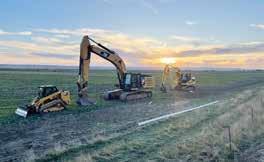
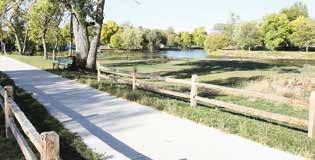

a complex business; to present ideas clearly, orally, and in writing, and to work effectively with others. Supervises the Deputy Finance Officer. Bachelor's degree in business or public administration preferred or three years' experience of clerical position in Municipal Government. Position is benefit eligible. Apply at the City of Eureka, PO Box 655, Eureka, SD 57437. Contact the City Office at 605-2842441 for more information. Open until filled. EOE.
Finance Officer – City of Kimball, SD. Reports to Mayor and City Council and is responsible for performing the fiscal, financial, budgetary, accounting and business management functions of the city. The full-time position includes competitive salary with benefits. For a description of nature and scope of the job and qualifications persons may e-mail kimballcitysd@midstatesd.net or phone (605) 778-6277. Open until filled. EOE.
Library Clerk – City of Hot Springs, SD. The Library Clerk position serves patrons of the Public Library in numerous capacities. Their role is to support the Library Director by maintaining and delivering the varied library services for the community. Wage: DOEQ-$14.59 TOS. Competitive benefits. All applicants must fill out a City of Hot Springs Job Application to be considered. Resume & cover letter are also encouraged for all full time positions. Applications can be sent to Mary Terrones or dropped off at the Hot Springs Public Library 2005 Library Drive. Open until filled.
Liquor Store/Bar Manager – City of Kadoka, SD. Retail and/or managerial experience is beneficial, but not required. Please return letter of interest, resume and/or completed application form to City Finance Officer, PO Box 58, Kadoka, SD 57543. Application forms are available at the City Finance Office. Full time. Includes health,


dental, and retirement benefits. Salary range $30,000 to $50,000, depending upon qualifications. Please call the City Finance Office at (605) 837-2229 if you have any questions. Open until filled. EOE.
Member Programs Coordinator - Missouri River Energy Services, Sioux Falls, SD. Assist MRES members in understanding, communicating and leveraging the value of public power and MRES. This may include, but not limited to, community development support, a utility best practices program, the Ambassador Program, and the Municipal Power Advantage Program (MPA). Coordinates initiatives designed to promote MRES and its services to the community. Establishes, develops, and maintains effective working relationships with departmental staff, municipal employees and policy makers; develops relationships with community leaders and serves as the organization’s liaison with various constituents; coordinate messaging and continuous engagement with the ambassadors. Learn more and apply at https://careers.mrenergy. com/job.
Parks & Recreation Administrative Coordinator – City of Spearfish, SD. The Parks and Recreation Administrative Coordinator will act as campground manager and perform regular office duties. Learn more and apply at https://cityofspearfish.criterionhcm.com/jobs/443/1. Open until filled.
Park Maintenance – City of Fort Pierre, SD. Maintenance and grounds-keeping for all City parks, campground, ditches, bike paths, rights-of-way, recreational facilities, and comfort stations. Plant trees, grass, and other vegetation; install landscaping and sprinkler systems. Operate and maintain a variety of equipment and hand/power tools. $2,000 Hiring Bonus. Starting wage $20.00/hr and negotiable depending on qualifications and certifications such as CDL & Applicator's License, plus excellent benefits: health/vision/ life insurance, vacation/sick leave, and SD Retirement System. Learn more and apply at www.fortpierre.com (Employment Opportunities), or by request at 605-223-7690, admin1@fortpierre.com, or P.O. Box 700, Fort Pierre, South Dakota 57532. Open until filled. EOE.
Parks and Recreation Director – City of Lennox, SD. Seeking a highly skilled and motivated Parks and Recreation Director. Manage, direct, supervise, and coordinate various recreation programs, special events, and operations for the community; manage volunteer coaches; manage paid & volunteer umpires; manage concession stand inventory and volunteer schedule, facilitate use of all City athletic resources to community sports organizations; coordinate assigned activities with other City Departments, outside organizations, and the general public. Oversees and coordinates maintenance, care, and improvement of City parks, open space areas, forestry, and native areas. Requires work during irregular hours throughout the year, including nights and weekends as necessary. Learn more at cityoflennoxsd.com or call City Hall at 605-647-2286.
Patrol Officer - City of Mitchell, SD. Responsible for the enforcement of federal, state, and local laws and the protection of life and property. Some of the job duties include: patrol the city to detect and deter criminal activity and traffic violations and to provide assistance as needed; monitors commercial and residential areas for signs of criminal activity; responds to calls for service, including domestic disputes, assaults, burglaries, traffic accidents, lost or missing persons searches, public service requests; completes required reports and forms, including accident and incident reports. Starting wage: $28.773 per hour. $3,000 relocation stipend. Competitive benefits. Learn more and apply at www.cityofmitchellsd.gov. Open until filled.

Patrol Officer – City of Pierre, SD. Performs law enforcement & public safety duties as necessary to maintain law & order in the City of Pierre. Must be at least 21 years of age, have a high school diploma or GED, & pass the police entry level examinations including a background investigation. Prior experience in law enforcement is desirable. Certified officer preferred. Up to $2000 annually for educational reimbursement. Up to $6000 hiring bonus. Comprehensive benefit package. Learn more and apply: Human Resources Office, City of Pierre, Box 1253, Pierre, SD 57501, (605)773-7429, www.cityofpierre.org. Open until filled. EOE.
Police Officer – City of Spearfish, SD. Enforce local, state, and federal laws, prevent and suppress crime and accidents, and promote public safety through community policing principles. This position will be responsible for the investigation of criminal cases as assigned. Full-time position. Learn more and apply on the “Career Opportunities” page at www.cityofspearfish.com. Starting wage: $30.13 per hour. ~Sign-On Bonus $6,000~ Competitive benefit package. Open until filled. EOE.
Police Officer – City of Springfield, SD. General law enforcement to preserve public peace, protect lives, property and rights of the public as well as to enforce statutory law and municipal ordinances. Pay: $25-$30 DOEQ; Eligible retention bonus $3,000–$5,000. Competitive benefits. Formal application required, resumé with experience, education, qualifications recommended; potential oral interview and reference check; job related tests may be required. Contact City of Springfield Finance Office for more information and/ or an application at amanda.larson@springfieldsd.gov or (605) 3692309. Open until filled.
Police Officer (Entry Level/Lateral Entry) - City of Vermillion, SD. Duties include performing varied assignments in motorized patrol, traffic control and enforcement, accident investigation, preliminary and follow-up investigation at crime scenes, and assisting in public safety education programs. To learn more about the police officer position and to complete an application, please visit the City of Vermillion's job page: https://www.vermillion.us/Jobs.aspx or if you have questions about the position please call/email Jack Baustian at 605-677-7050 or jackb@cityofvermillion.com. Open until filled.
Police Officer (full- or part-time) – City of Viborg, SD. Position will conduct routine patrols, including enforcing traffic laws and maintaining visibility within the city, including local, state, and federal laws. The candidate must have excellent communication skills and work well with the general public. A high school diploma or GED is required. A certified officer is preferred. Competitive benefit package. Contact the City of Viborg for more information at 605-326-5103 or cityofviborg@hcinet.net. Please submit resume along with application, which is found at www.viborgsd.org/jobs. html. Open until filled. EOE.
Police Property/Evidence Manager – City of Spearfish, SD. Serves as a non-sworn member of the organization. The position has a variety of critical responsibilities and administrative duties within the property and evidence functions of the police department. Responsibilities include maintaining the evidentiary chain of custody and integrity of evidence and property. Under general supervision this position will receive, record, account for, store, safeguard, collect, load, transport, verify, release, and disburse evidence, and found or abandoned property. Manages separate property and evidence storage areas and performs work as required. A significant degree of initiative, independent judgement, discretion, and confidentiality is paramount. Learn more and apply at https:// cityofspearfish.criterionhcm.com/jobs/443/1. Open until filled.
Public Works Director – City of Fort Pierre, SD. Provides technical assistance that will impact decisions on the day-to-day distribution of the workload of field staff, tactfully handles engineering related questions or problems, works with the City Superintendents, Assistant Public Works Director, or other staff for resolution of such issues. Maintains a professional presence and respectfully answers questions by staff and general public. $2,000 Hiring Bonus. Minimum starting salary $90,000/yr negotiable depending on qualifications and certifications, plus excellent benefits. Learn more and apply at www.fortpierre.com (Employment Opportunities). Open until filled.
Public Works Director (part-time) – City of Delmont, SD. Performs work in maintenance of all phases of water distribution and supply, wastewater collection system and lagoon, maintenance and repair of streets and alleys, maintenance of parks, dump ground, any and all city property. Questions: Barb Dozark, 605-779-2621, delmontfinance@midstatesd.net. Application and resume may be
sent to: Delmont Finance Office, PO Box 202, Delmont, SD 57330. Open until filled.
Public Works Operator - City of Flandreau, SD. Qualified candidates will have experience operating heavy machinery, working as a member of a team, a valid Class A CDL, and knowledge of water distribution and wastewater collection systems. Serves under the direction of the Public Works Director and will perform task in the City Streets, Parks, Water, and Sewer Departments. Hiring range is $19.27 to $25.69 hourly, includes competitive benefits package. Submit application and resume to cohlturnquist@cityofflandreau. com. Learn more at cityofflandreau.com under the “Employment” tab. Open until filled. EOE.
Public Works Utility Assistant - City of Hecla, SD. Experience with electrical, water and wastewater is beneficial, but not necessary. Starting wage depends on experience and/or qualifications, PLUS a full benefit package that includes SD State Retirement, Single Health Insurance, Holiday, Vacation and PTO. Application & Job Description can be picked up at the City office located at 206 Main Street in Hecla or requested to be mailed/emailed by calling (605) 994-2333. Open until filled.
Relationship Manager (full or part-time) – PMA for the South Dakota Public Funds Investment Trust (SDFIT), Remote Work within South Dakota. Responsible for sales and marketing efforts of PMA products and services (including the Local Government Investment Pools (SDFIT) and Separately Managed Accounts) for local government clients and prospects across South Dakota. Remote work opportunity with expectations of travel (50% or more) to meet business needs. Great interpersonal skills are essential, as
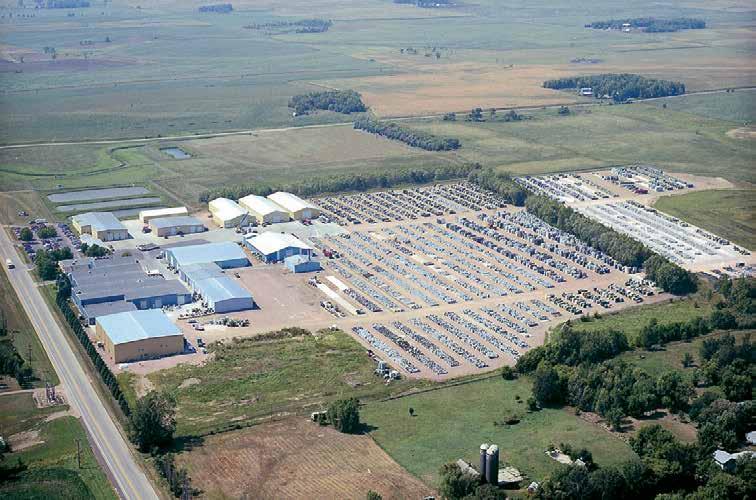

a primary focus will be the addition of new accounts (Municipal and School Related) while collaborating with the team to assist existing relationships (retention). Competitive salary and benefit package; opportunity for annual discretionary bonus based on results. Learn more and apply online at www.pmanetwork.com/careers. Open until filled.
Senior Accountant, Enterprise Utility - City of Fargo, ND. Performs responsible, professional accounting and analytical duties under the general direction of the Finance Manager and works closely with the Utility Department Heads. Will collaborate regarding funding sources, prepare applications for loan and/or grants, work with consultants, assist with management of budget, and other tasks. Learn more and apply at Fargond.gov/apply. Closes Dec. 3. EOE.
Service Technician/Equipment Operator – City of Vermillion, SD. Duties to include: light and heavy maintenance on construction equipment, operate light and heavy-duty equipment, inspection, repair, clean-up, adjustments, and other tasks on City fleet, and other duties further outlined in the job description found in the link below. To learn more about the position and to complete an application, please visit the City of Vermillion's job page: https://www.vermillion. us/Jobs.aspx or if you have questions about the position please call/ email Jack Baustian at 605-677-7050 or jackb@cityofvermillion.com. Open until filled.
Staff Engineer – City of Pierre, SD. Assists City Engineer in providing technical services related to City of Pierre infrastructure projects. Responsible for preparation and administration of annual construction and materials contracts. Also assists Building Officials in plan review and issuing Building Permits. Duties include project feasibility analysis, infrastructure analysis & planning, infrastructure cost estimating, municipal infrastructure project design & review, and construction project administration. Comprehensive benefit package. Up to $2000 annual educational assistance available. Wage offer will be based upon actual education and experience. UP TO $3000 HIRING BONUS! Learn more and apply at www. cityofpierre.org. Open until filled. EOE.
Street Maintenance - City of Fort Pierre, SD. Participate in the construction, maintenance, repair, rehabilitation, and cleaning of City streets, alleys, curbs, gutters, storm drains, and related structures. Perform traffic signing and striping work along with operating and maintaining a variety of equipment and hand/power tools. $2,000 hiring bonus. Starting wage $20.00/hr and negotiable depending on qualifications and certifications such as CDL, plus excellent benefits: health/vision/life insurance, vacation/sick leave, and SD Retirement System. Learn more and apply at www.fortpierre. com (Employment Opportunities), or by request at 605-223-7690, admin1@fortpierre.com, or P.O. Box 700, Fort Pierre, South Dakota 57532. Open until filled. EOE.
The
Wastewater Operator – City of Hot Springs, SD. Performs a variety of unskilled and semi-skilled maintenance work, and operates a variety of equipment and tools in the construction, operation, repair, maintenance, and replacement of City of Hot Springs water supply, distribution, or wastewater treatment facilities and systems. May also be assigned to provide general public works maintenance support work in other public works areas. Wage: DOEQ $15.74 TOS. Competitive benefits. All applicants must fill out a City of Hot Springs Job Application to be considered. Resume & cover letter are also encouraged for all full time positions. Applications can be sent to Tracy Bastian-Public Works Engineer or dropped off at City Hall 303 N River St. Hot Springs, SD 57747. Open until filled.
Generator - The City of Leola is selling a 1997 JR Hollingsworth 30 kilowatt 3-phase generator for $3,000 (obo) with no delivery options. Contact the city office at 605-439-3299 or email: leola@ valleytel.net for more information.
Find full descriptions, links to applications, more listings, or place an ad online:
CLASSIFIEDS POLICY: $50 per submission. SDML members receive classified ads for free as part of their membership. Includes a listing on the SDML classifieds webpage and in the next issue of the SD Municipalities magazine if received by the 10th of the month preceding the publication date. Submissions may be subject to editing. ■
November 2024 issue, page 8. “SDML Hall of Fame” An incorrect photo was used for inductee Dale Hettick, Board of Trustee Member, Roscoe. The corrected entry follows.

Board of Trustee Member, Roscoe, 22 years
Dale is the owner of Dale's Building Supplies in Roscoe, so he's very knowlegeable on construction needs. Fittingly, he has served on various positions with both our Council when we had an Aldermanic form of Government, and our recent change to a Trustee form, regarding building supervisor, streets, water, and sewer. He has always been a member residents are willing to talk to.
December 25 – Christmas Day – State holiday (SDCL 1-5-1)
December 31 – Liquor licenses are valid from twelve o’clock midnight on the thirty-first day of December until twelve o’clock midnight on the thirty-first day of the following December. (SDCL 35-441; See Hdbk., sec. 11.465)


By January 14 – If the governing body chooses an election day other than the second Tuesday of April, as provided in SDCL 9-13, that Election Day must be established by January 14 of the election year. (SDCL 9-13-1; See Hdbk., sec. 7.050)
First meeting of the year – A complete list of all the salaries for all officers and employees of the municipal corporation shall be published with the minutes of the first meeting following the beginning of the fiscal year or within 30 days thereafter. Added salaries of new employees and increased salaries of the old employees should be shown in the month in which they occur. A total of payroll by department shall be published monthly in the minutes. (SDCL 6-1-10; See Hdbk., sec. 5.095)


Newspaper designation – The official newspaper must be designated annually or for a period of time specified by the governing body, but not to be less than twelve months. (SDCL 9-12-6)
Boundary changes – Municipalities must notify the Department of Revenue of any resolution or amendment enacted which changes the boundaries of the municipality. Notification shall be in written form, shall contain a copy of the resolution or amendment, and may be sent by electronic means or registered mail. Municipalities shall also provide any changes and additions to streets and addresses. (SDCL 10-52-13; See Hdbk., sec. 14.172) ■

Jan 2025
6 7 8 9 10 11
13 14 15 16 17 18 19 20 21 22 23 24 25 26 27 28 29 30 31
January 1 – New Year’s Day – State holiday (SDCL 1-5-1)
January 1 – The municipal fiscal year begins. (SDCL 9-21-1; See Hdbk., sec. 12.065)
January 1 –
Special assessment installments which are payable under either the Plan One or Plan Two option are due. (SDCL 9-43103; See Hdbk., sec. 12.160)
January 1 – One of two dates (the other being July 1) a new or amended municipal tax ordinance may become effective. The municipality must notify the Department of Revenue of the ordinance at least 90 days prior to the effective date. (SDCL 10-52-9; 10-52A-13; See Hdbk., sec. 12.260)
First meeting of the year – A complete list of all the salaries for all officers and employees of the municipal corporation shall be published with the minutes of the first meeting following the beginning of the fiscal year or within 30 days thereafter. Added salaries of new employees and increased salaries of the old employees should be shown in the month in which they occur. A total of payroll by department shall be published monthly in the minutes. (SDCL 6-1-10; See Hdbk., sec. 5.095)
By January 14 – If the governing body chooses an election day other than the second Tuesday of April, as provided in SDCL 9-13, that Election Day must be established by January 14 of the election year. (SDCL 9-13-1; See Hdbk., sec. 7.050)
By January 15 – The secretary of revenue shall apportion the money in the local government highway and bridge fund. (SDCL 32-11-35; See Hdbk., sec. 12.255(6))
Between January 15 and 30 – Publication of the notices of vacancies of the municipal election to be held in April is required to be published in the official newspaper once each week for two consecutive weeks between January 15th and 30th. This notice shall identify the vacancies to be filled and the time and place for filing nominating petitions. (SDCL 9-13-6; See Hdbk., sec. 7.650) Follow the Municipal Election Calendar for all election deadlines.
Third Monday of January – Martin Luther King, Jr. Day –State holiday (SDCL 1-5-1)
Utility board – Is required to make an annual report of its operations immediately after end of the fiscal year. (SDCL 9-39-29; See Hdbk., sec. 12.080)
Newspaper designation – The official newspaper must be designated annually or for a period of time specified by the governing body, but not to be less than twelve months. (SDCL 9-12-6)
Boundary changes – Municipalities must notify the Department of Revenue of any resolution or amendment enacted which changes the boundaries of the municipality. Notification shall be in written form, shall contain a copy of the resolution or amendment, and may be sent by electronic means or registered mail. Municipalities shall also provide any changes and additions to streets and addresses. (SDCL 10-52-13; See Hdbk., sec. 14.172) ■



